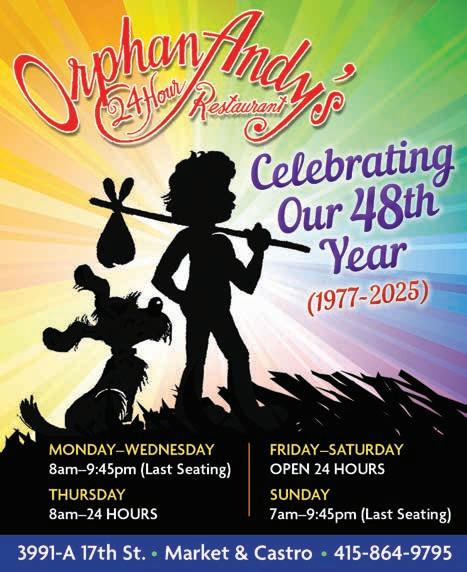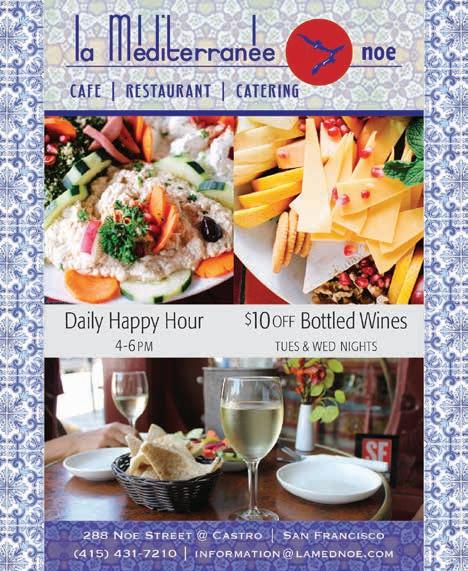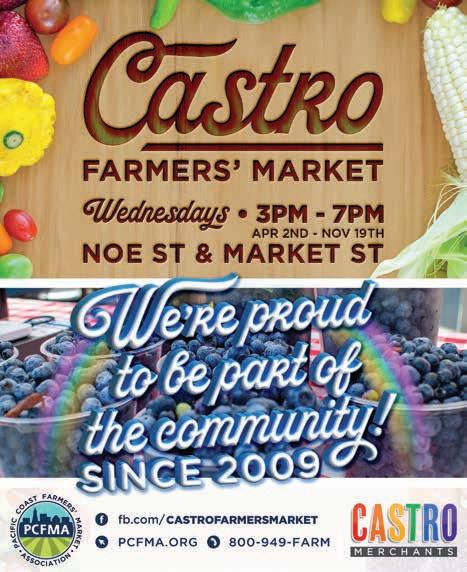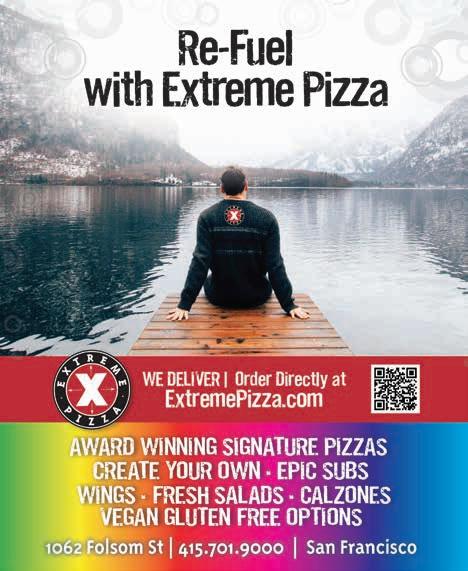

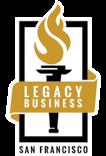

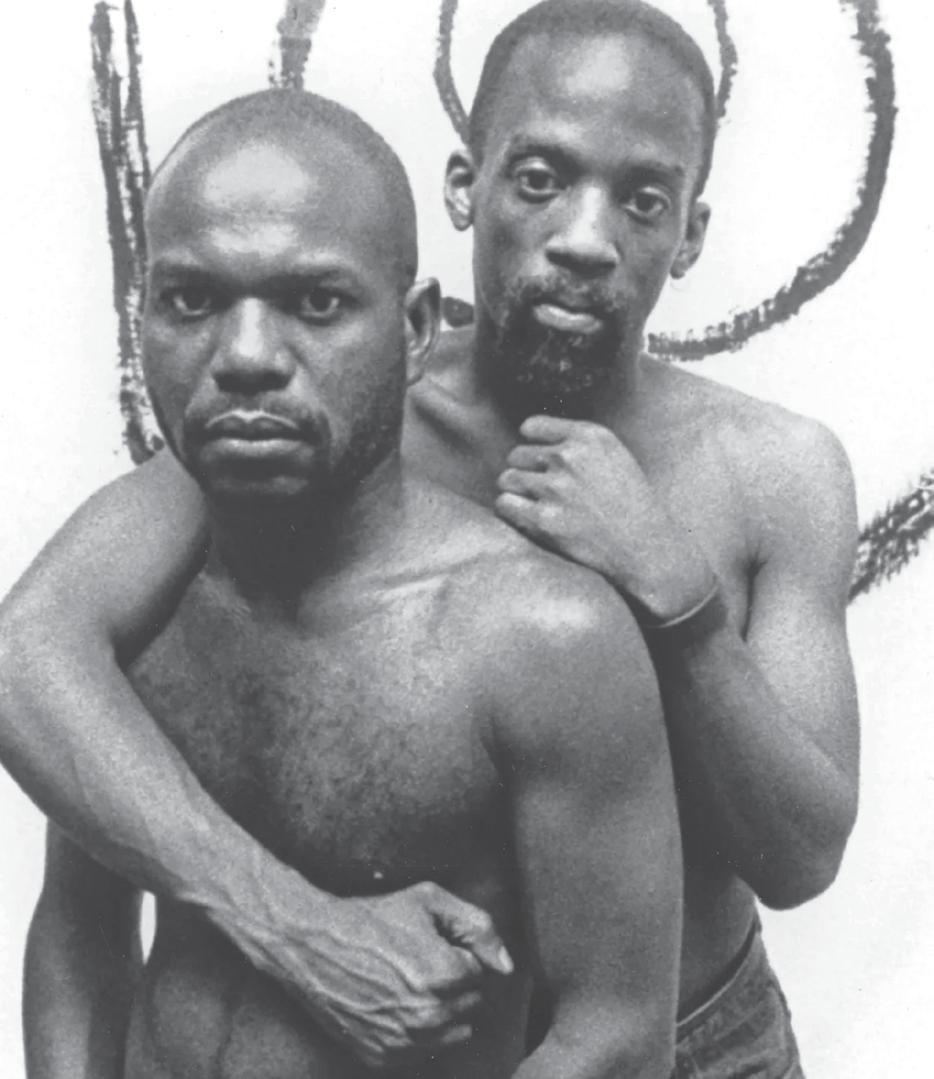


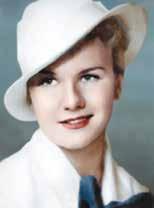
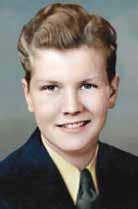

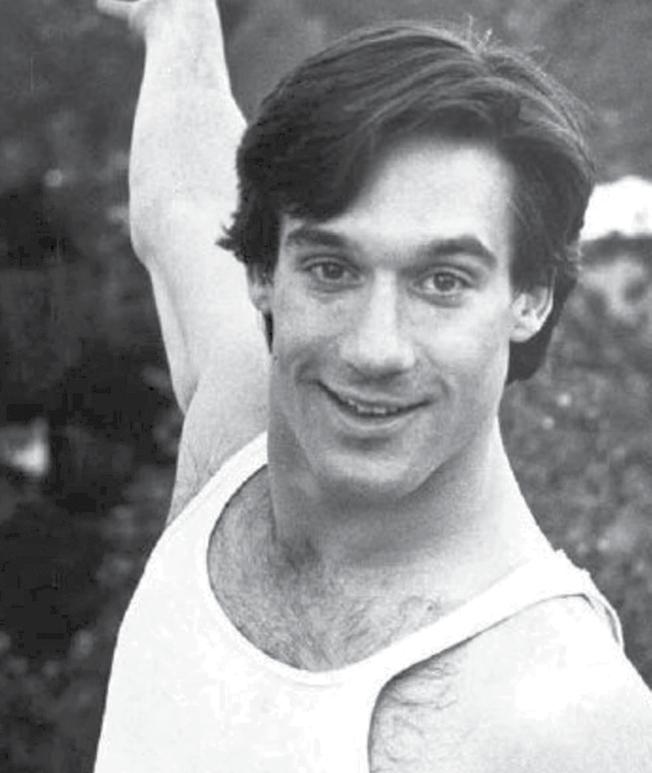
















As of this writing, the Trump administration is putting pressure on Congress to pass the Rescissions Act of 2025, following the administration’s successful recent passage of the One Big Beautiful Bill Act. The Senate must pass the Rescissions Act before July 18, 2025. If not, the White House will be obligated to allocate the funds as previously set forth. If the rescissions happen, at least $9 billion in funding will be canceled for HIV/ AIDS programs, National Public Radio, the Corporation for Public Broadcasting, and numerous other important services.
Unpacking the Rescissions Act of 2025
Specifically, the bill would rescind funds that were provided to the State Department or the president for:
• contributions to certain international organizations;
• contributions for international peacekeeping activities;
• global health programs including several combating HIV/AIDS;
• migration and refugee assistance;
• the Complex Crises Fund;
• the Democracy Fund;
• the Economic Support Fund;
• contributions to the Clean Technology Fund;
• development assistance;
• assistance for Europe, Eurasia, and Central Asia;
• international disaster assistance; and transition initiatives.
The bill would also rescind funds that were provided for:
• USAID operating expenses;
• the Inter-American Foundation;
• the U.S. African Development Foundation
• the U.S. Institute of Peace; and
• the Corporation for Public Broadcasting.


According to the Center on Budget and Policy Priorities: “The proposed rescission package would reduce funding for a range of global assistance programs, including global health programs, development assistance, and migration and refugee assistance. For example, the rescission package would cut $400 million from programs to combat HIV/AIDS, including the President’s Emergency Plan for AIDS Relief (PEPFAR), a program started by former President George W. Bush. Senate Appropriations Chair Susan Collins noted that the PEPFAR program ‘has saved more than 26 million lives’ and ‘remains a bipartisan priority of Congress.’ She further noted that, ‘Cutting funds now—funding that is aimed at preventing disease transmission—would be extraordinarily ill-advised and shortsighted.’”
On June 12, 2025, the House with a razor thin margin 214–212 vote approved the Rescissions Act of 2025, which is now headed to the Senate that can pass it with a simple majority (51 votes). Much is at stake, including $1.1 billion in public media funding that was already approved by law. While federal funding only makes up about 15% of PBS’ overall revenue, the percentage varies significantly for individual stations. In rural areas, it can account for up to 60% of a station’s revenue, according to Corporation for Public Broadcasting (CPB) President and CEO Paula Kerger. The CPB, a nonprofit established by Congress, receives an annual appropriation of around $500 million—just a fraction of the $1.1 billion—which it then distributes to public television and radio stations nationwide. It is easy to understand why those annoying yet necessary pledge breaks are critical, since the rest of the funding comes from individual donors along with corporate sponsors and grants.

Northern California and the Central Valley, KIXE based in Redding, KVPT located in Fresno, and numerous others. All provide high quality, educational programs, with each station striving to match its particular demographic needs. PBS Español, for example, has grown in importance over the years, offering a variety of programming, educational resources, and online content designed for Spanish speakers and learners.
Certain members of our San Francisco Bay Times team have worked for PBS stations, and continue to donate both to public television and public radio stations. Bay Times columnist Leslie Sbrocco is a wellknown television host at KQED. Other Bay Times team members choose to donate simply because they value the programming of PBS and NPR.
They are also now supporting the nonprofit Protect My Public Media, which is calling for members of the public to contact their local senators with this message:
On July 15, Senator Eric Schmitt (R-Missouri) announced that he and the other Senate Republicans, along with the Trump administration, are now willing to remove the $400 million cut to PEPFAR. If that holds, at least the salvaged funds would help preserve this global initiative aimed at accelerating progress towards controlling the HIV/AIDS pandemic in over 50 countries worldwide. To see a list of PEPFAR supported countries and regions, go to: https://bit.ly/4nMx6CJ
In terms of the proposed cuts to public television and radio: “The federal government is the largest single funding source for public television and radio stations.
California has several PBS stations serving rural communities, such as KVIE of
“Please prevent serious and lasting harm to our local public media stations. I urge you to
Eliminating all federal funding beginning this fall would end a multi-decadeslong funding relationship that has long had bipartisan support, in part because this funding plays a particularly important role in smaller, more rural and isolated communities with limited alternatives for local news and public alerts.
On June 10, 2025, the White House issued a statement that included, in part, “H.R. 4 would rescind radical and wasteful foreign assistance spending at the Department of State, the U.S. Agency for International Development, and the U.S. Institute of Peace amongst other foreign assistance programs. These rescissions would eliminate programs that are antithetical to American interests and values, such as funding radical gender ideology, ‘equity’ programs, and policies that threaten our energy security. In addition, H.R. 4 would rescind federal spending on the Corporation for Public Broadcasting, which subsidizes a public media system that is politically biased at the taxpayers’ expense.”

For example, Senator Mike Rounds has said that there are Native American radio stations in South Dakota that ‘will not continue to exist’ if their funding is cut without replacement.”

support removing the proposal to rescind $1.1 billion in already-approved funding for the Corporation for Public Broadcasting from the rescissions package.
This funding supports the vital services provided by local public radio and television stations in communities of all sizes. Every public media station would feel the impact and be forced to cut back on local journalism and programming, educational content and outreach for children and workers, and life-saving emergency communications. But rural and tribal stations would be hit hardest. For many of these stations, federal funding accounts for the largest share of their budgets, and there simply aren’t enough local resources to replace it. Without this support, they face the very real risk of shutting down entirely, leaving entire regions without critical resources.

House majority leader Stephen Scalise (Republican, Louisiana) has strongly championed the Rescissions Act and is known for anti-LGBTQ+ stances. The GLAAD Accountability Project notes that he voted against The Respect for Marriage Act and the Equality Act. He opposed the repeal of The U.S. military’s “Don’t Ask, Don’t Tell” policy. He opposed adding federal hate crimes protections for
(continued on page 18)
Public media reaches nearly every American, and local stations remain among the last locally operated media sources serving communities, especially in areas with unreliable broadband or populations too small to attract commercial media. For about $1.60 per person annually, this investment ensures access to essential services. These stations are irreplaceable.
Rescinding these funds would make our communities less safe, less informed, and less connected. Please protect public media and the millions of Americans in your state who rely on it every day by removing this harmful proposal from the package and rejecting any effort to defund public media.”
California Senators Alex Padilla and Adam Schiff, as for other Democrats, are against the Rescissions Act. Support for PBS has been bipartisan, however, so we encourage you to share this Protect My Public Media link with friends, relatives, and colleagues in other states: https://protectmypublicmedia.org/rsc-calls/ The information at that site provides instructions on how to call local lawmakers to voice
(continued on page 18)

Public broadcasting has played a notable role in contributing to the national discourse on LGBTQ+ rights since at least the early 1960s, predating even the establishment of the Public Broadcasting Service on November 3, 1969. That is because stations such as KQED were already in existence by that time. KQED was the sixth public television station in the United States, signing on for the first time in 1954.
Here is a look back at some historic LGBTQ+ moments on public media:
1961 - The First Television Documentary About Homosexuality Broadcast in the U.S.
1970 - Largest Gathering of LGBTQ+ Leaders to Date on Television
WNDT via the series Newsfront ran an episode on June 24, 1970, just four days before the first gay Pride parade known as the Christopher Street Liberation Day March in New York City. The program included seven gay liberation leaders, believed to be the largest such gathering for a widely viewed television show.

1991 - First Nationwide Airing of a Major Documentary About and By Gay Black Men
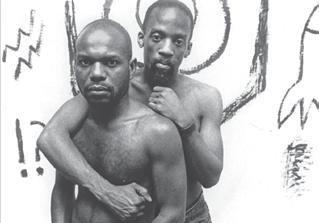
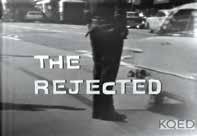
The first television documentary about homosexuality broadcast in the U.S. was The Rejected, which initially aired on KQED TV in San Francisco on September 11, 1961. The program featured discussions with experts from various fields, including a psychiatrist who argued against the notion of homosexuality as a mental illness. That was a radical stance for the period. The documentary was groundbreaking in its explicit focus on homosexuality at a time when the topic was largely avoided or portrayed negatively in mainstream media.
1962 - First Out Lesbian on a Show Discussing Lesbianism
KTTV in Los Angeles, which was an independent station from 1954–1986, ran a series called Argument that included an episode “Society and the Homosexual.” It featured one of the first ever out lesbians on television discussing lesbianism.
1965 - American Sexual Revolution Founder Albert Ellis on Stations Nationwide
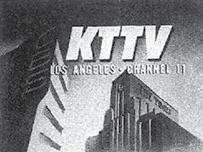
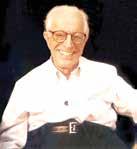

Psychologist and psychotherapist Albert Ellis (1913–2007) is widely viewed as one of the primary founders of the American Sexual Revolution that resulted in more nuanced views toward sex and morality. His work paved the way for women’s rights, LGBTQ+ rights, and more. Ellis’ views on homosexuality changed over the years, with him concluding at first that it was not inherently good or evil and later that everyone should, as his 2001 book held, enjoy Sex Without Guilt. Eight years before the American Psychiatric Association declared that homosexuality was not a mental disorder, Ellis appeared on National Educational Television (a precursor to PBS) on the “Every Tenth Man” episode of the series Other Voices.
1966 - Balanced View of Homosexuality
WPBT in Florida ran a locally produced program called The Homosexual that discussed the topic from various angles, including law enforcement and gay activism.

1973 - First Openly Gay Person on Television as Part of a Family Unit
Arguably the most influential LGBTQ+ moments on PBS occurred during the 12-hour documentary series
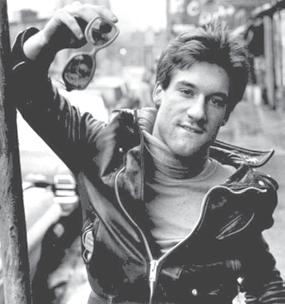
An American Family. The series is believed to be the first ever reality show, and it followed the lives of the Loud family in Santa Barbara, California. Lance Loud (1951–2001), the oldest of the family’s five children, made history by becoming the first continuing character on television who was openly gay. Unlike the previous mentioned shows, this series had a huge viewership for the time (an estimated 10 million) ran from coast to coast, and was broadcast at airtimes that allowed multiple generations to watch.
1982 and 1983 - Major National Stars in Productions With Prominent LGBTQ+ Themes
In 1982, the year that the acronym AIDS was officially adopted and fear over the illness was gripping the nation, the series American Playhouse ran a program called the “Fifth of July,” starring Richard Thomas, then known to nearly all television viewers as the star of the hit show The Waltons. In this program he played a gay paraplegic Vietnam veteran who lived at his family home with his boyfriend.
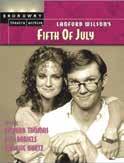
In 1983, yet another major national star, Milton Berle, headed up the cast of the American Playhouse production, “Family Business.” Berle played a wealthy man who is dying and wishes to make amends with his sons, one of whom is openly gay.
1989 - Helping Preserve the Legacy of James Baldwin
An early program as part of the American Masters series was “James Baldwin: The Price of the Ticket.” It chronicled the life of the openly gay writer and civil rights activist who had died just two years before.

PBS ran the powerful 1989 documentary Tongues Untied produced by Marlon Riggs (1957–1994) despite national controversy that had everyone from conservative religious leaders to Republican U.S. Senators to rightwing presidential candidates criticizing the film before it even ran. The poetic film years later, in 2022, was selected for preservation by the National Film Registry by the Library of Congress for being “culturally, historically, or aesthetically significant.”
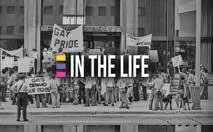
Scagliotti was interviewed about the history of the series, and why he elected to work with PBS. That too is archived and may be viewed at https://bit.ly/3GHN7cg
These are just some of the important programs directly concerning the LGBTQ+ community that have run on PBS and related stations. They do not even take into account the widely viewed shows promoting acceptance and diversity that originated on public broadcasting, such as Mr. Rogers Neighborhood, The Electric Company, Zoom, and Sesame Street that influenced generations of kids and their parents.

Airing for 20 years, In the Life—created by Emmy-award-winning producer John Scagliotti— was the first and longest running national LGBTQ+ television program in history. Guest hosts included Gavin Newsom, Madonna, RuPaul, and countless others who went on to even greater prominence. Segments also addressed individuals of historical significance, such as jazz musician and bandleader Billy Tipton (1914–1989), who is now viewed as a pioneering transgender man. While many of the other mentioned programs have been lost over time, thankfully the UCLA Library’s Film & Television Archive has preserved all episodes of In the Life: https://bit.ly/463cJL3


PBS has been both a mirror to LGBTQ+ rights, reflecting cultural and legal changes over the decades, and an educational tool that has helped shape the viewpoints of its audiences. The responsibility of that latter role has not been taken lightly, and especially for children’s programming. Child psychologists and educators, for example, were extensively consulted by the creators of Sesame Street to ensure the series is both educational and engaging. Focus groups were also organized to evaluate the content and to make sure that the show represented diverse experiences and perspectives. Such lengthy and painstaking work along with community
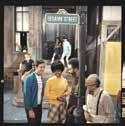
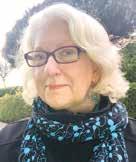
Honest and truly, this is meant to be a pep talk. But first we need to acknowledge what we’re up against. For months we’ve been saying it’s going to get worse before it gets better. And here we are: It has gotten much worse, and we need to face it.
These past few weeks have been particularly brutal for anyone who cares about our country, our democracy, and the people who live here. Republicans in Congress sold out the health and well-being of the American people to make a handful of people who are already ungodly rich even richer. The Supreme Court is shredding constitutionally protected rights as they bend a knee to a man whose grasp of reality is visibly sliding away. Our government is in the hands of people who are not only grotesquely incom-
petent, but also blatantly, even gleefully, hateful and cruel. They treat the rule of law as mere suggestions to be ignored while they ratchet up the militarization of our country.
When tanks roll down otherwise peaceful streets in Los Angeles, when ICE vehicles plow into protesters in San Francisco, when immigrants are snatched off the streets or from their workplace by masked thugs and sent to who-knows-where with no hope of due process, yes, we have become an authoritarian state. And enormous amounts of money that Republicans swore were not available to feed hungry children are being spent to build for-profit concentration camps. Federally-sanctioned “labor camps”—that is, slavery—are next.
None of this is normal. None of this is acceptable. They are doing their darndest to frighten us all into submission, and to break our spirits so we feel helpless, and will give up. But don’t despair—here comes the pep talk.
The good news is that we far outnumber those who are causing such harm, so let’s not give them the satisfaction of frightening us into submission. Resistance networks have been growing in size, strength, and ability, and some are now providing training where you can gain skills in resisting strategically, effectively, and nonviolently.
One Million Rising is a nationwide effort to train 1,000,000 people in peaceful non-compliance and disruption tactics. Big one-day protests like No Kings Day are important
and powerful, but they are just the beginning; sustained organizing is key to resistance. Sign up here for the trainings: https://tinyurl.com/MillRise
The administration has made clear their threat to come down hard on sanctuary cities. We have seen what they have done in Los Angeles; we can expect similar tactics here in San Francisco and the Bay Area. It’s up to all of us to raise our voices to protest these actions, in every way possible. Indivisible has put together an online toolkit for those of us who live in blue states to help us speak up effectively: https://tinyurl.com/BlueStDef
Support AIDS Walk July 20
AIDS Walk San Francisco is returning to Golden Gate Park on Sunday, July 20, 2025, and after 39 years, it is needed more than ever.
Anyone who survived the early years of the AIDS pandemic can tell you that community was key to surviving the trauma not just physically, but emotionally. And that’s what AIDS Walk has always provided: a community of people who come together to support each other, not just by raising money and awareness, but also by providing solidarity.
Since the moment the new administration took office in January, they have made it quite clear that they have no use for people with HIV. By attacking PEPFAR and USAID and making life-saving HIV medications unavailable in regions that lack robust healthcare systems, they condemned count-
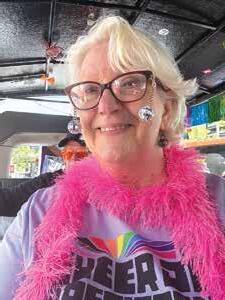
less people around the world to die. And here in the U.S., by slashing funding for HIV prevention programs, research, and care, they are risking even more devastation here at home. Their actions are unspeakably cruel.
That’s where AIDS Walk comes in. While you and I may have little power in Washington, D.C., we do have the power to come together to help our local organizations
(continued on page 18)
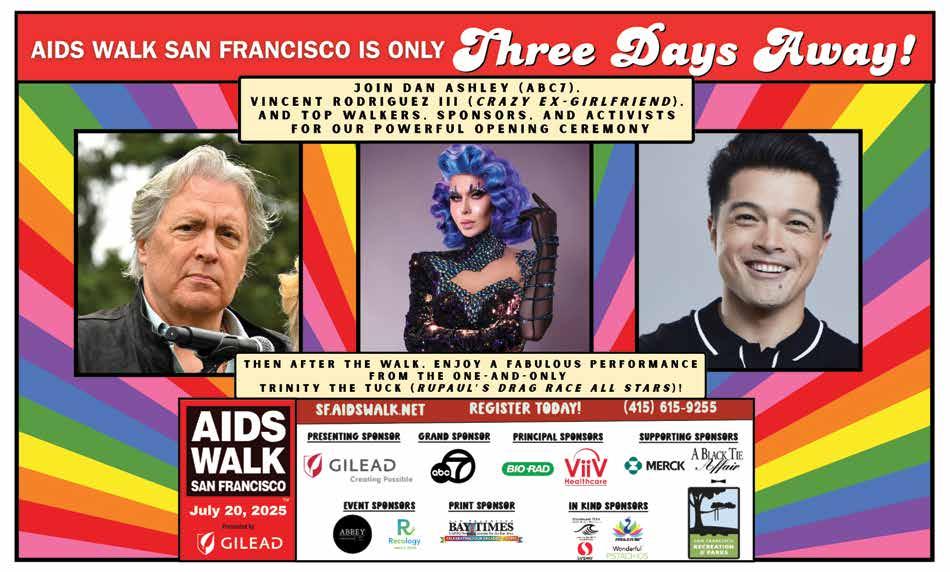
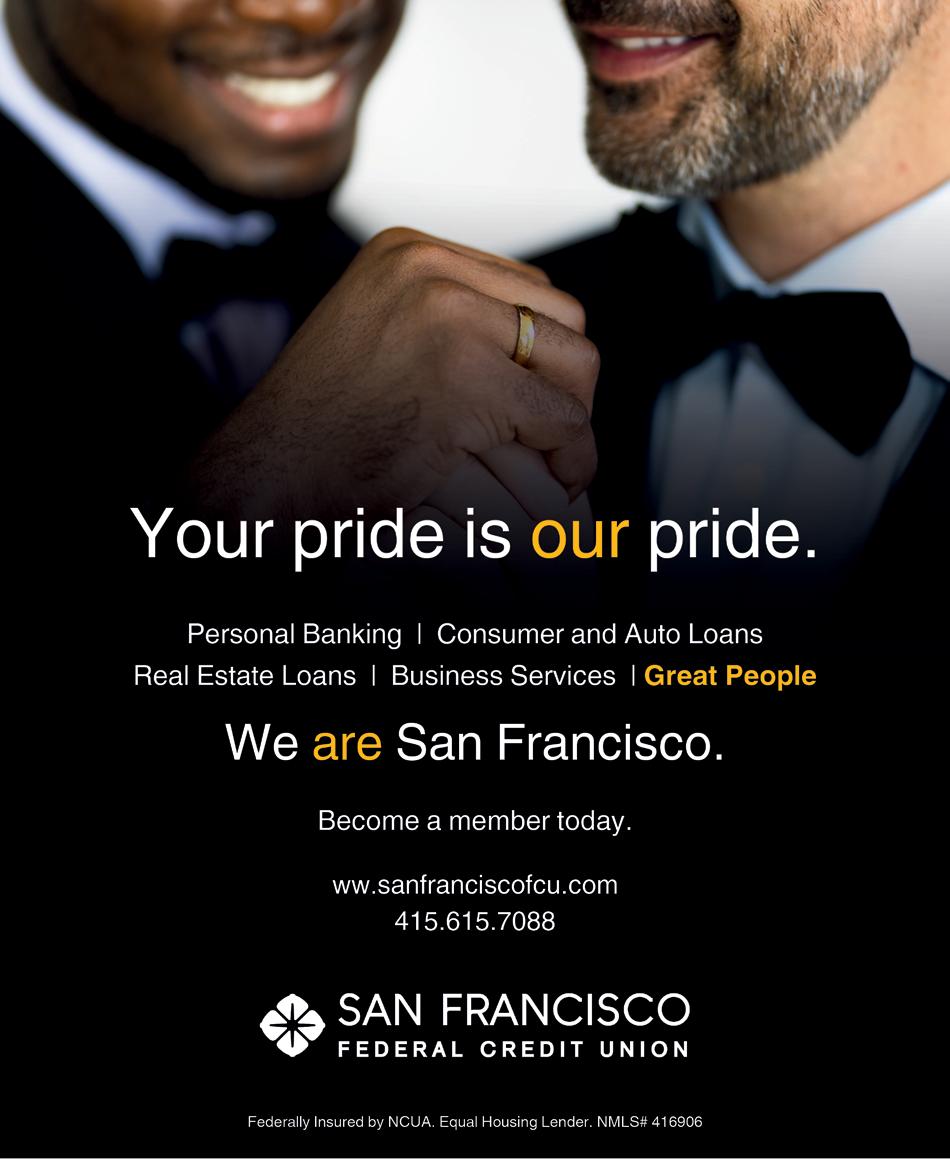


At the City Hall VIP Pride Party on Sunday, June 29, 2025, Dr. Marcy Adelman received San Francisco Pride’s Teddy Witherington Award for lifetime contributions to the LGBTQ+ community. She is the Co-Founder of Openhouse and a longtime San Francisco Bay Times columnist.
Dr. Adelman and her partner Jeanette Gurevitch (1949–2003) founded the nonprofit Openhouse in 1998 to provide affordable senior housing and services. The organization now serves over 3000 LGBTQ+ older adults. Dr. Adelman was also recognized for her decades of advocacy that have elevated the need for LGBTQ+ culturally competent mental health and dementia services that led to the development of programs and services in San Francisco.

Most recently she helped initiate, develop, and disseminate the first statewide LGBTQ+ aging survey to provide robust sexual orientation and gender identity data to create effective policies and programs for California’s aging LGBTQ+ population.
After receiving the award from SF Pride in a ceremony attended by Mayor Daniel Lurie, State Senator Scott Wiener, and SF Pride Executive Director Suzanne Ford, Dr. Adelman said, “Best Pride ever!! So honored to receive the SF Pride Teddy Witherington Award for lifetime contribution to the LGBTQ community. Thank you, Mayor Lurie, Suzanne Ford, and the San Francisco Pride Board, and thank you to my dear friends for being there with me. What a truly beautiful moment. I am so grateful for our community.”

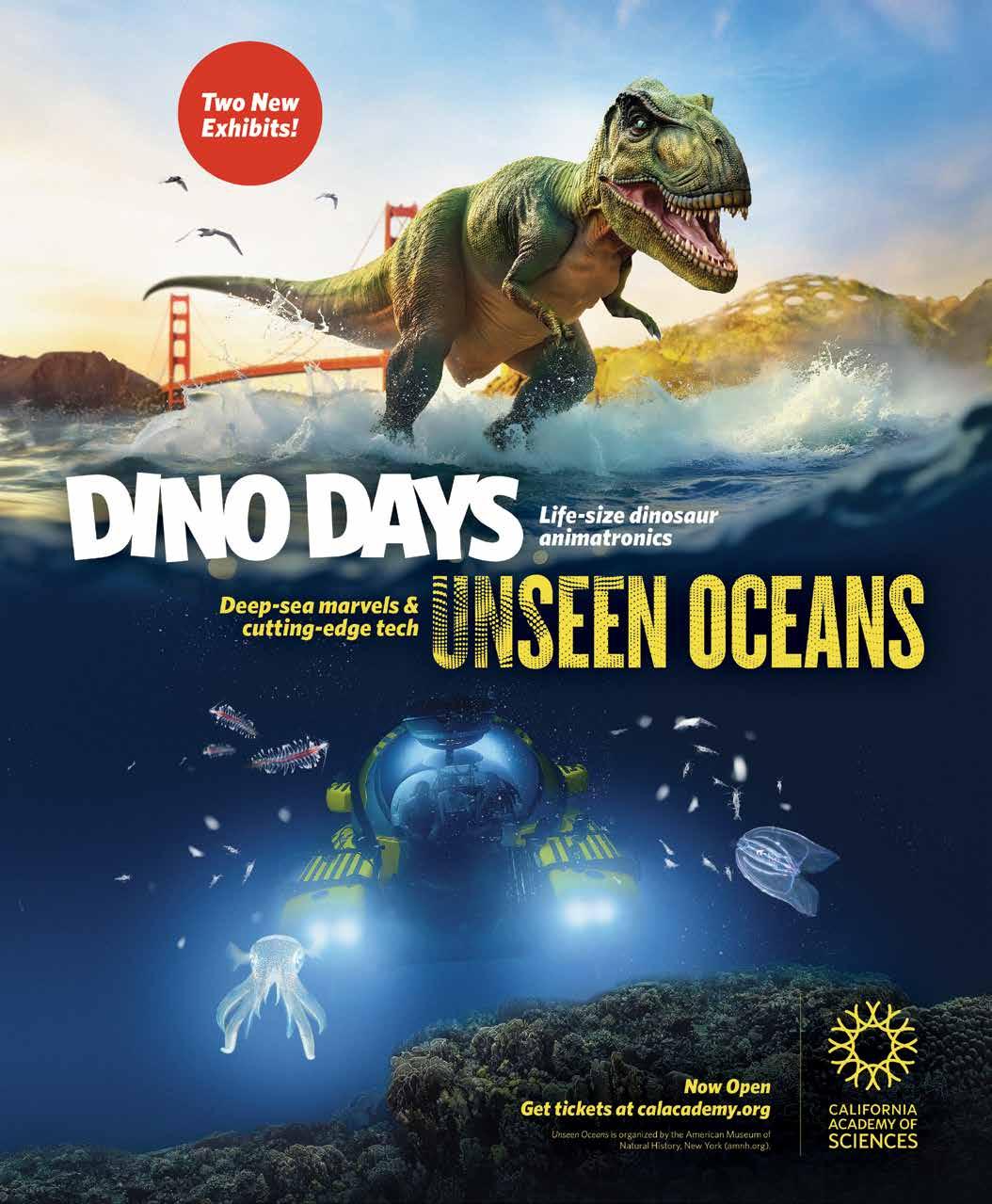


Roland Schembari and Bill Hartman, Co-Founders
Randy Alfred, Founding News Editor, 1978
Kim Corsaro, Publisher 1981-2011
2261 Market Street, No. 309 SaN FraNciSco ca 94114 PhoNe: 415-601-2113
525 Bellevue aveNue oaklaNd ca 94610
e-Mail: editor@sfbaytimes.com www.sfbaytimes.com
The Bay Times was the first newspaper in California, and among the first in the world, to be jointly and equally produced by lesbians and gay men. We honor our history and the paper’s ability to build and strengthen unity in our community.
The Bay Times is proud to be the first and only LGBTQ newspaper in San Francisco to be named a Legacy Business, recognizing that it is a longstanding, community-serving business that is a valuable cultural asset to the city.
dr. Betty l. SullivaN/JeNNiFer l viegaS co-PuBliSherS & co-editorS
Beth greeNe, JohN SigNer, Michael delgado deSigN & ProductioN
kate lawS BuS NeSS MaNager
Blake dilloN caleNdar editor
kit keNNedy Poet-iN-reSideNce
J.h herreN techNology director
carla raMoS weB coordiNator
Mario ordoNez diStriButioN
JuaN r davila voluNteer coordiNator
CONTRIBUTORS
WRITeRS
Rink, Sister Dana Van Iquity, Ann Rostow, Patrick Carney, Leslie Sbrocco, Kate Kendell, Gary M. Kramer, Joanie Juster, Robert Holgate, Eduardo Morales, Dennis McMillan, Tim Seelig, John Chen, Rafael Mandelman, Jewelle Gomez, Phil Ting, Rebecca Kaplan, Philip Ruth, Bill Lipsky, Elisa Quinzi, Liam Mayclem, Beth Schnitzer, Andrew Freeman, Kippy Marks, Catherine Stefani, Donna Sachet, Gary Virginia, Derek Barnes, Marcy Adelman, Jan Wahl, Stuart Gaffney & John Lewis, Brandon Miller, Jamie Leno Zimron, Howard Steiermann, Fernando Camino, Honey Mahogany, David Landis
PhOTOgRaPheRS
Rink, Paul Margolis, Bill Wilson, Michael Kirschner, Sandy Morris, Karina Patel, Abby Zimberg, Joanie Juster, Debra Reabock
aDVeRTISINg
Display Advertising Standard Rate Cards http://sfbaytimes.com/ or 415-601-2113
Custom ad sizes are available. Ads are reviewed by the publishers.
National Advertising: Contact Bay Times / San Francisco. Represented by Rivendell Media: 908-232-2021
Circulation is verified by an independent agency. Reprints by permission only.
CaLeNDaR
Submit events for consideration by e-mail to: calendar@sfbaytimes.com
© 2025 Sullivan Communications, Inc



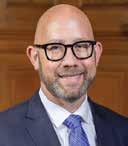
Rafael Mandelman President, San Francisco Board of Supervisors
June was a whirlwind month at City Hall. I spent much of the month deep in hearings and negotiations over our city’s two-year budget. It wasn’t an easy process and no one got everything they wanted, but we were able to restore critical services, including protecting funding for legal aid, housing support, and community-based organizations.
June was also Pride Month, and I was honored to once again march alongside so many of you in San Francisco’s Pride Parade! But this month also brought reminders of the work still ahead. In a deeply disappointing move, the Department of Defense announced it would strip Harvey Milk’s name from the Navy ship that once bore it—a shameful erasure of an American hero. But San Francisco will not let bullies erase Harvey’s legacy. On the last Friday of Pride Month, I joined the Mayor to announce that the long-awaited renovation of Harvey Milk
Plaza in the Castro will begin next year.
On June 26 I held two hearings on San Francisco’s behavioral health crisis at the Public Safety and Neighborhood Services Committee. The first focused on San Francisco’s implementation of Senate Bill 43 (2019), which expanded the eligibility criteria for conservatorship to include individuals with severe substance use disorder.
The second was on the Residential Care and Treatment Workgroup’s findings and recommendations on San Francisco’s treatment bed inventory. I had asked Mayor Breed to convene the Workgroup following the passage of Prop 1 in March 2024, and I co-chaired the group.
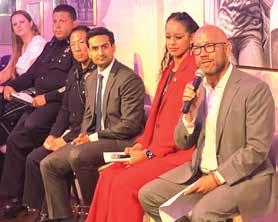
I will continue pressing our departments to turn promises into real, on-the-ground help for people struggling with mental illness and substance use. As always, thank you for your support, your partnership, and your commitment to a more compassionate, livable San Francisco.
In-Person Office Hours
Join me in-person on Saturday, July 19, from 10 am–Noon at Duboce Park Cafe. To reserve a spot, email mandelmanstaff@sfgov.org
Upcoming District 8 Events
Wednesdays, 3 pm–7 pm: Castro Farmers’ Market - Every Wednesday on Noe & Market streets
Friday, July 18, 5 pm–10 pm: Castro Night Market - Enjoy local food vendors, merchants,
and live entertainment on the third Friday of every month.
Saturday, July 19, 4 pm–8:30 pm: Glen Park Night Market - Enjoy local food vendors, merchants, and live performances on Kern Street (Diamond to Brompton)
Tuesday, July 29, 4:30 pm–8:30 pm: Noe Valley Night Market - With the expanded footprint onto 24th Street, the Noe Valley Night Market is growing! Enjoy live entertainment, local artists, and delicious food.
Rafael Mandelman is the San Francisco District 8 Supervisor and the President of the San Francisco Board of Supervisors. https://bit.ly/4iQvwvY

By Ann Rostow
Damn This Court
I’ve had an extra week off between columns, and when I checked my last news report, I realized that I only discussed two issues: first, the High Court’s ruling in Skrmetti, allowing states to outlaw medical care for transitioning youth, and second, a description of some lesbian venture capitalist who was accused of wasting investor funds on living the high life with her female “business partner.” Left by the wayside were all the other ups and downs of our vibrant community, but now, weeks and weeks have passed us by and these items have vanished into the hazy netherworld of old news. Please accept my apologies for depriving you of a comprehensive account.
Today, my news list begins with yet another anti-GLBT opinion from the Supreme Court, this one a 6–3 ruling that forbids school districts from adding five gay-themed books to library reading lists without allowing religious parents to opt out.
Well, you might say, what’s the big deal?
Just let those loonies pull their kids out of school if their knickers got in such a twist. And that would be fine if, let’s say, GLBT reading hour was scheduled in advance for Monday at 10 am. But these books were part of a large collection of kids’ literature that included tons of books of all kinds and all subjects. It sounds as if the reading time was somewhat random as well, making it impossible to opt out of any and all encounters with what the religious parents considered disturbing content. Further, there are plenty of legal precedents stating that faith cannot be used to bow out of generally applicable laws or policies, and that schools cannot be expected to carve out specific learning plans to suit parental whims.
“Innumerable themes may be ‘contrary to the religious principles’ that parents ‘wish to instill in their children,’” wrote Justice Sotomayor in dissent (quoting Alito’s majority opinion). “Books expressing implicit support for patriotism, women’s rights, interfaith marriage, consumption of meat, immodest dress, and countless other topics may conflict with sincerely held religious beliefs and thus trigger stringent judicial review under the majority’s test. Imagine a children’s picture book that celebrates the achievements of women in history, including female scientists, politicians, astronauts, and authors. Perhaps the book even features a page that states, ‘Girls can do it all!’ That message may be directly contrary to the religious principles that ‘a parent wish[es] to instill in their chil[d].’ In the majority’s view, it appears, that is sufficient to trigger strict scrutiny of any school policy not providing notice and opt out to objecting parents.”
Strict scrutiny, as you may know, is a legal test so onerous that a state or employer or some other authority is almost never able to make a case for an offending policy. Alito managed to contort himself into imposing strict scrutiny on the Montgomery County (Maryland) Board of Education, a test they predictably failed.
“This Court has made clear that mere
exposure to objectionable ideas does not give rise to a free exercise claim,” wrote Justice Sotomayor elsewhere, referring to the more sensible Courts of times gone by. “That makes sense: Simply being exposed to beliefs contrary to your own does not ‘prohibi[t]’ the ‘free exercise’ of your religion ... . The Constitution thus does not ‘guarantee citizens a right entirely to avoid ideas with which they disagree.’”
In the Bleak Mid-Summer
It’s hard to focus on cases like the aforementioned storybook lawsuit or the transgender health ban when the same court has also given a temporary green light to ending birthright citizenship, an explicit part of the text of the Constitution, allowing mass firings of public employees, and saying okay to closing a cabinet department without debate or process. These were done through the infamous “shadow docket,” where justices can rubber stamp or shoot down the rulings of lower courts without written explanation, but the Roberts Court seems unlike any High Court bench in American history. Even those Courts that came up with outrageous decisions back in the day were reflecting the open racism of their time, but Roberts and company seem to be operating outside the law.
As legal commentator Chris Geidner wrote on his Law Dork blog, Roberts “is looking less like the conservative institutionalist that he sought to present himself as for the first 15 years of his time on the court and more like a Republican senator who might say behind closed doors that he disagrees with President Donald Trump’s methods but then votes right along with the most MAGA senator.”
His “presumptive decision to assign the [storybook case] opinion to Alito,” Geidner wrote elsewhere, “is yet another mark of ignominy on Roberts’ increasingly irredeemable time as chief.”
Unfortunately, our Supreme Court coverage is far from done. The Court has accepted another big GLBT case, to be heard when these bozos reconvene in October. That, by the way, is when their next session begins, but they still manage to cause trouble in the summer months as well.
As Geidner reports, the Court recently turned away petitions from the parents of transgender kids who were trying to make a separate argument in favor of transition health for minors. Parental rights are considered “fundamental” in constitutional law, and parents of transgender kids have argued that the bans on any medical intervention, including puberty blockers and hormones, interfere with these guaranteed rights. In the Skrmetti case, which was accepted in 2024 and decided last month, the Court only accepted an Equal Protection question that asked why trans kids could not have puberty blockers in Tennessee, while some cisgender kids could.
Let’s not go into the Court’s answer again, but let’s note that the Court decided not to
(continued on page 18)

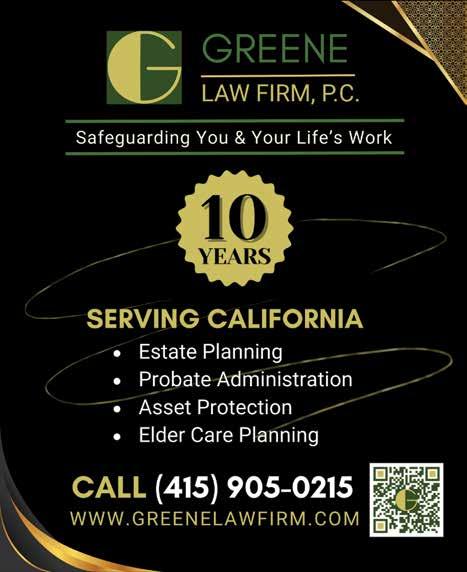
Coinciding with San Francisco’s annual Pride Weekend, San Francisco Opera celebrated the LGBTQIA+ community with a special Pride Concert featuring immersive projections and a postshow dance party on Friday, June 27, 2025, at the War Memorial Opera House. San Francisco Opera’s Caroline H. Hume Music Director Eun Sun Kim and Robert Mollicone led the San Francisco Opera Orchestra and soloists Jamie Barton, Brian Mulligan, and Nikola Printz.
Tal Rosner’s video designs filled the hall, and Justin A. Partier was the night’s lighting designer.
Concluding San Francisco’s Pride Weekend, on Sunday, June 29, the Company joined other local arts institutions to march in the 55th Annual San Francisco Pride Parade.

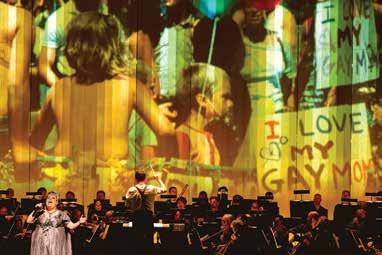
Sapphira Cristál hosted the Pride Concert. A powerhouse performer and finalist from RuPaul’s Drag Race Season 16, and a classically trained opera singer, Cristál brought her signature grace, glamour, and unapologetic authenticity to the Opera House stage. She shared, “Pride, for me, is about … standing in the full glory of who I am—past, present, and future. It’s about celebrating not just my individuality, but also my connection to a powerful, beautiful community that has made space for my authenticity, art, and joy.”
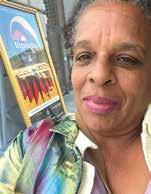
The evening also included a pre-show Happy Hour with discounted food and drinks, an interactive Altar of Remembrance by the Marigold Project, an LGBTQIA+ Historical Exhibit by the GLBT Historical Society, sections of the AIDS Memorial Quilt display by the National AIDS Memorial, a pre-show discussion with SF Pride Executive Director Suzanne Ford, and a post-show dance party led by DJ Juanita MORE!
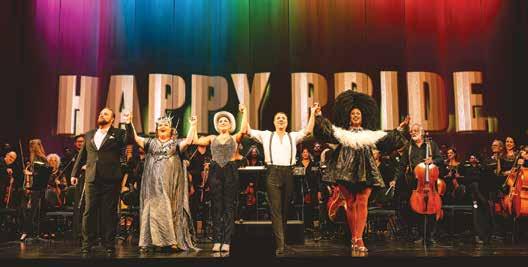
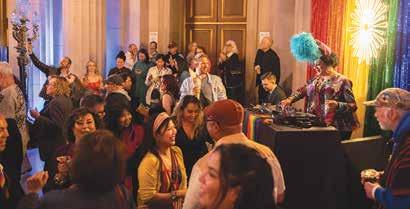


Drag legend and columnist Donna Sachet attended on behalf of the San Francisco Bay Times, which also had a ticket giveaway with the winner being Arlene Edwards of GLIDE Memorial Church.
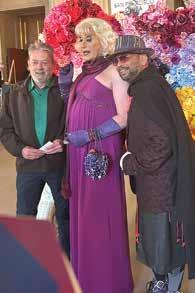
Sachet commented at the event, “This is proof we exist.” Both she and Edwards greatly enjoyed the memorable evening, and are already looking forward to next year’s concert.
The organizers shared afterward that “the War Memorial Opera House was illuminated—by music, by light, by joy, and by the power of community. San Francisco Opera’s first-ever Pride Concert wasn’t just a performance. It was a declaration. Of queer brilliance. Of belonging. Of love in all its forms. From the soaring voices on stage to the shimmering projections overhead ... from dancing in the lobby to tears in the final ovation ... it was a night that reminded us why we gather, why we sing, why we celebrate.”
They added, “To every artist and audience member—thank you. You made history with us. We’ll see you next year.”
https://www.sfopera.com/
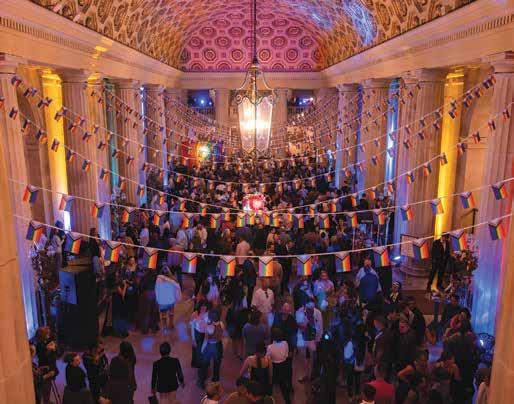

LBy Donna Sachet
ooking back on what must have been a record-breaking San Francisco Pride, we are so proud of our LGBTQ+ Community at large and the many successful events that kept us busy all month. But we will particularly cherish those moments shared with friends along the way.

We remember sharing the Business of Pride annual gala with Gary Virginia, amazed at the variety and resilience of so many LGBTQ+ owned and operated Bay Area businesses. We remember joining the Reigning Emperor Ashlee Blow and Reigning Empress Afrika America at City Hall for the official ceremonial raising of the Rainbow Flag from Mayor Daniel Lurie’s balcony. This was our first joint appearance with these new monarchs and gave us great confidence that the imperial Crowns are on the right heads.
We were so fortunate to catch a performance of Opera Parallele’s Harvey Milk: Reimagined at Yerba Buena Arts Center with Nic Hunter, a delightfully attentive escort. We always appreciate being included in the dedication ceremony for the Pink Triangle atop Twin Peaks. Patrick Carney consistently finds not just the hundreds of volunteers needed to create this landmark symbol, but he also brings much of the elected leadership of the city to this ceremony.
We returned to the original location of Sunday’s a Drag, now Starlite in the Beacon Grand Hotel, to perform with Holotta Tymes in a special Pride Show. So many cherished memories of Sundays with Harry Denton and Michael Pagan came back.
We participated in the largest civil rights demonstration in decades, No Kings, starting at Dolores Park with thousands of engaged citizens, reminding us that this is a city that cares and takes action.
We delighted at Richmond/Ermet Aid Foundation’s version of Broadway Bares at 1015 Folsom, congratulating Joe Seiler & Ken Henderson on their 8th such successful show. We were mesmerized by the film on Opening Night of the Frameline Film Festival, especially enjoying personal conversations afterwards in the Toni Rembe Theater at the Director’s Reception. Don’t forget that Frameline will return to the Castro Theatre next year for their 50th annual film festival!
Back in the Castro neighborhood, we joined hundreds for the most successful Castro Night Market yet with a main stage emceed by Sister Roma and including a stellar cast of performers. We continued our support of the AIDS Legal Referral Panel at a Garden Party at Hot Johnnie’s with picnic foods, festive hats, and joyful people.
We couldn’t miss the SF Gay Men’s Chorus Pride Concert at the Curran Theatre, attending with Sal Tovar. This was one of the most deeply personal concerts in years, focusing on experiences of members of the trans and non-binary community. Then, a brand-new event caught our eye: Threads of Pride, a fashion show with a purpose, produced by Nas Mohammed, at Yerba Buena Arts Center. We were in the excellent company of Suzan Revah & Tim Mahaffey and other friends with ring-side seats. What a refreshing new idea, executed to perfection, including a surprise finale with legendary model Pat Cleveland.
We were happy to participate in the Human Rights Summit at the Commonwealth Club with panelists Sister Roma, Susan Gonzales, Amp Somers, and Celso Dulay, offering us another chance to work with the very talented Michelle Meow. This panel discussion of AI and the specific challenges it presents to our community gave everyone much to ponder.
And what would SF Pride be without Divas & Drinks, the San Francisco Bay Times event at The Academy SF, this time commemorating the legalization of same-sex marriages 10 years ago. It was like a reunion of friends and associates from years of activities, including Geoff Callan, Dan Ashley, Carolyn Wysinger, Nguyen Pham, and Stuart Gaffney & John Lewis
For a little Classical music, we dove into the SF Opera Pride Concert with amazing talent on stage and an exhilarating dance party in the lobby afterwards with DJ Juanita MORE! Even Pink Saturday returned to the Castro with a sea of pastels and a bevy of celebrants!
To finish things off, we joined Betty Sullivan and Jennifer Viegas on the Bay Times double-decker bus for the SF Pride Parade. What could be more perfect than cruising down Market Street with many of our best friends to the acclamation of thousands of parade attendees? Our Pride celebration came to a splashing end at City Hall, the Rotunda decorated with hundreds of colorful balloons and filled with the people who make this city the fabulous place it is to live and party! It was truly a month of memorable moments, made more significant because of those with whom they were shared!
“My crown is called content: a crown that seldom kings enjoy.”
Shakespeare’s Henry VI , Part 3
Sunday, July 20
Help Is on the Way XXXI: Broadway & Beyond Richmond/Ermet Aid Foundation’s annual gala Leanne Borghesi, Jason Brock, Sam Harris, Bruce Vilanch, Lisa Vroman, Paula West, members of the cast of & Juliet Marine Memorial Theater, 609 Sutter Street
VIP reception after at the Beacon Grand Hotel, 450 Powell Street 7:30 pm $49 & up www.reaf.org
Tuesday, July 22
Bruce Vilanch It Seemed Like a Bad Idea at the Time: The Worst TV Shows in History and Other Things I Wrote Book-signing and interview Benefits Richmond/Ermet Aid Foundation Oasis, 298 11th Street 7 pm $29 & up www.reaf.org
Thursday, July 24
Farewell Dinner for Consul General Sergio Strozzi Honoring the Consul General and husband Simone Mazzetto Proceeds benefit the Rainbow Honor Walk Poesia Osteria Italiana, 4072 18th Street 6 pm $250 www.rainbowhonorwalk.org
Friday, July 25
8th Anniversary of The Academy SF Celebration & party
The Academy SF, 2166 Market Street
7–11 pm $20 & up www.academy-sf.com
Donna Sachet is a celebrated performer, fundraiser, activist, and philanthropist who has dedicated over two decades to the LGBTQ Community in San Francisco. Contact her at empsachet@gmail.com

Dr. Tim Seelig
One of the most poignant songs of my generation was John Denver’s Leaving on a Jet Plane. That opening line, “All my bags are packed, I’m ready to go,” still stirs deep emotions on so many levels. I’ve been the leaver often, packing my bags many times. I’ve also been the one left behind. Now in my 75th year on the planet and surrounded by folks my age (my new choir), I am constantly reminded that the final trip is coming sooner than later. Time to pack some bags for that trip. I’ve begun by checking things off my bucket list. Last week, I went skydiving. You’ll hear much more about it next month!
I know some of what leaving leaves. I’ve lost many. I lived through the 1980s and 1990s
losing people I loved weekly. I’ve lost all but one of my immediate family members. This was brought to mind most recently while watching my granddaughter graduate from 8th grade. Her mother wasn’t there to witness it. The absence is a reminder how sometimes people leave far too soon.

Sudden, tragic, without warning.
I’ve shared the “Ball in a Box” concept before. At first, the grief ball takes up all the room in the house like a giant exercise ball bouncing around, knocking over your furniture and making it hard to breathe. But over time the grief ball shrinks. It never disappears. It lives in a little box in the corner of your heart. Most days, you can walk around it. But then bam, you stub your emotional toe, and it all comes rushing back.

So, here’s my question: If leaving is inevitable, why don’t we talk more about the how and when we hope or want to leave? Why do we have to whisper about death like it’s a dirty word? When it

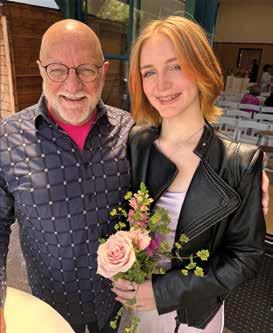

comes to The Big Departure, that discussion is taboo. We’re not supposed to talk about it. It’ll jinx it. Or summon it. Or offend someone.
It’s different for those of us who’ve been around the block ... and then circled back because we forgot what we came for. We’ve lived full lives, or at least long ones. If we’re honest, we are already packing those farewell bags. I watched both my parents pack for their final trips. It was not a quick, throw things in a duffle bag. Due to declining health, it lingered. There was a lot of humor.
My Mom, bless her heart, became what the Baptists call a “shut in.” No one ever clarified who shut her in or might one day let her out, but the church folks dutifully prayed for the shut-ins every Wednesday prayer meeting. My Dad eventually told her it was too hard to get her out twice a week, to church and the beauty parlor. Her big Texas hair-do won out. Her choice was made easier by the advent of drums, projection screens, and praise choruses replacing hymn books and the glorious music she had taught and sung. She was a storyteller. On one visit to the beauty parlor, her shampoo girl asked, “How are you, Mrs. Seelig?” Mom sighed, “I’m so scattered, I don’t know which end is up.” Without missing a beat, the shampoo girl said, “Well, you better decide, ‘cause I’m gonna wash one of ‘em.”
The time came when Mom needed a hospital bed at home. She was adamantly opposed. The family won. The day it arrived, she coincidently had her nails and hair done. She went to bed at about
10 pm. By midnight, she had crossed over to her final reward. She said she wasn’t going to sleep in a hospital bed. So, she didn’t.
My Dad was a Post-it guy. He put Post-it notes on each of the mementos from my parents’ fascinating lives. It had the name of the person who would be the recipient. He didn’t always ask if we wanted them or not. He moved the Post-its around depending on who had checked on him or not. When the Post-it musical chairs stopped, my son got the huge painting of Dad’s horses. He loves it.
Through heart attacks, a broken hip, three bouts of cancer, and a brain tumor the size of a golf ball, Dad fought off the grim reaper with a passion. I never understood this. He spent a lifetime preaching and singing hymns about the glories of heaven, as Christians do. And yet he fought it for as long as possible. At 94, he got an infected foot that resulted in sepsis. A day before he died, always finding humor, he said, “Well, I never thought the Lord was going to take me because of a bunion!”
Another line from a song has haunted me for decades. “Sometimes people leave you halfway through the wood.” It’s from Into the Woods. It’s true for children, for friends, for parents, and siblings. Eventually, all people are going to leave. I’ll be one of those people one of these days.
Even if you don’t get to walk all the way through the woods with those you love, you are responsible for the content of the bags they discover along the way once you are gone. Hopefully, it will be a path marked with laughter and love and Post-it notes. All my bags are packed. I’m not quite ready to go. But I’m thinking about it without fear. And if you’re wise, you’re thinking about it too.
Dr. Tim Seelig is the Conductor Laureate of the San Francisco Gay Men’s Chorus. http://www.timseelig.com/
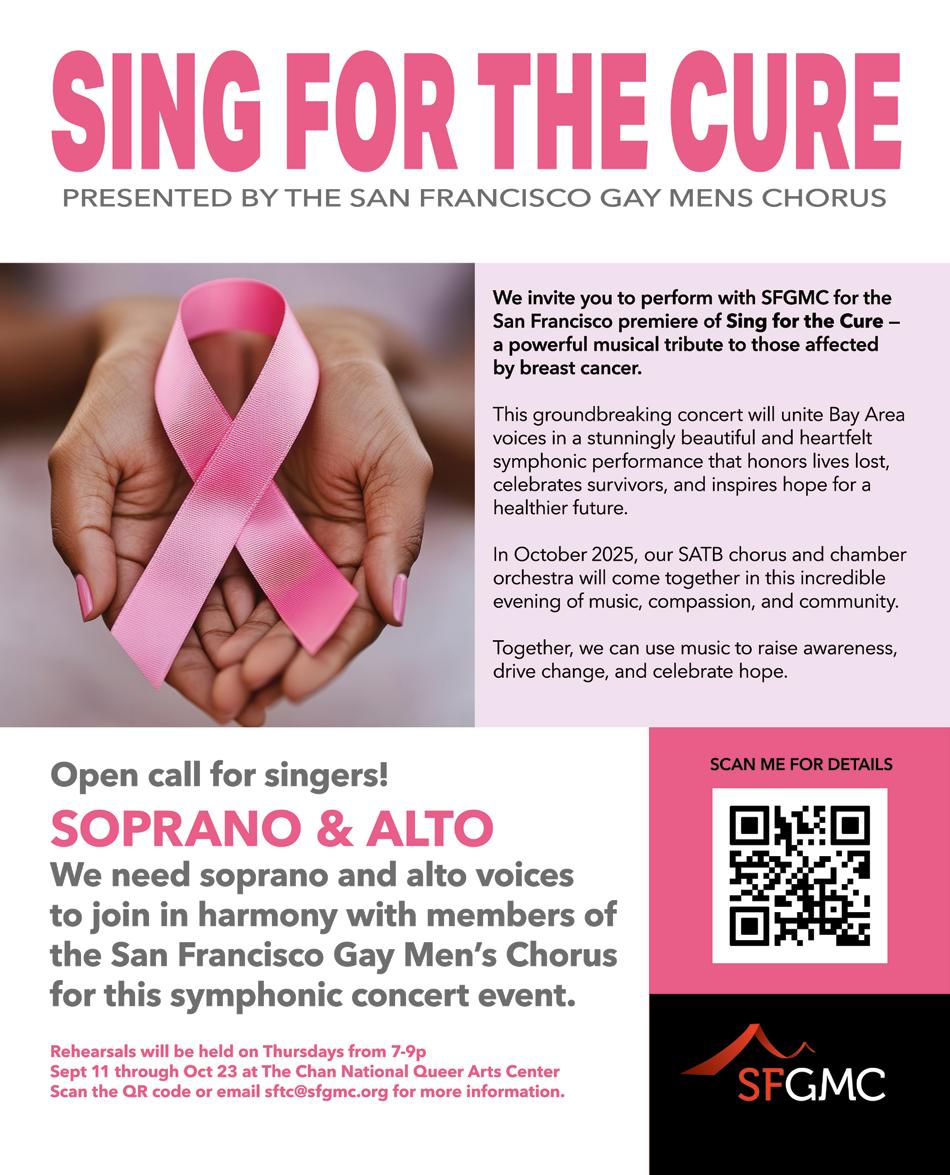
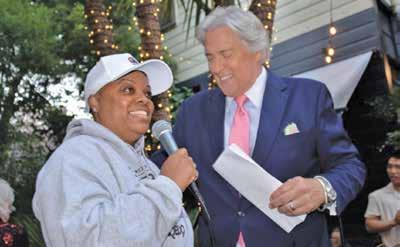
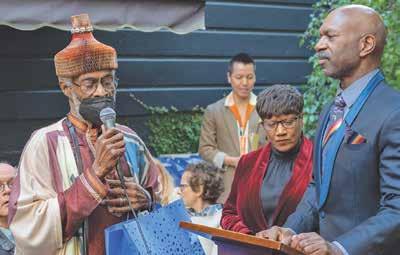
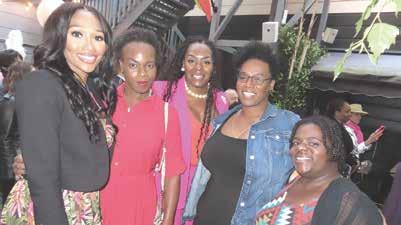
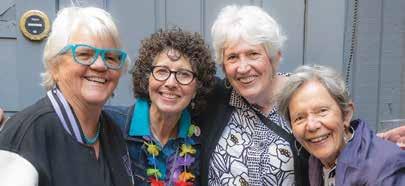
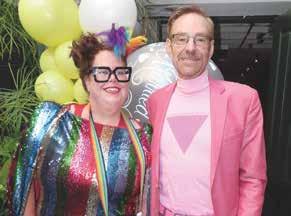





The San Francisco Bay Times annual Pride Kickoff Party took place on June 26, 2025, which this year fell on the precise day that, ten years ago, same-sex marriage was legalized nationwide on June 26, 2015, as a result of the Supreme Court’s landmark decision in Obergefell v. Hodges. The party was therefore dubbed “Cheers to 10 Years of Marriage Equality.”
The evening was co-hosted by The Academy SF, the site of the event, with co-sponsors Soul of Pride and the Bayard Rustin Coalition. They were represented by Lisa Williams and Lawrence Shine, whose successful and longstanding organizations present awards each year. Many of the honorees attended the event to accept their beautifully designed glass sculptural awards from Williams and Shine.
Their honorees included Amber Gray and Franzetta Houston, Outstanding Leadership - Ongoing Commitment Advocacy; Ernest Andrews and Randy Jordan, Outstanding Leadership - Community Mentorship; Imani Rupert-Gordon & Derah Rupert-Gordon, Outstanding Leadership - Community Organization; Jahnel Butler, Outstanding Leadership - Healthcare Advocacy; Kamar Ali Nibletj, Outstanding Leadership – Community Engagement; Kaylah Marin and Deidre Washington-Marin, Outstanding Sponsorship Support - Pride Partner Award; and Mary Midgett, an esteemed community elder, who received the Bayard Rustin Lifetime Achievement Award for outstanding contributions to education, mentorship, and senior community advocacy.
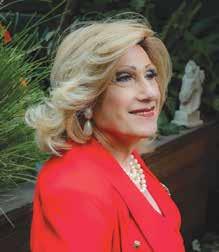
Following those presentations, El Cerrito Mayor Carolyn Wysinger led a symbolic recommitment ceremony that included dozens of couples led by
Marriage Equality USA co-founders Stuart Gaffney and John Lewis.
ABC7 New anchor Dan Ashley reflected on his own memories of the marriage equality movement and the evening’s timely program. It also happened to be the night of his own wedding anniversary, so he had a shout-out to his wife and to the importance of everyone being able to wed the person they love.
Ashley then introduced filmmakers Geoff Callan and Mike Shaw, whose 2005 documentary Pursuit of Equality chronicled the role of California Governor Gavin Newsom who, as San Francisco Mayor, gave the order back in 2004 that same-sex marriages would be certified by the city. Callan is Governor Newsom’s brother-in-law and, with Shaw and his team, had unprecedented access to the real-life drama that unfolded during what has since been called The Winter of Love.
Additional highlights of the June 26 party included the introduction of San Francisco Pride Executive Director Suzanne Ford by Co-Emcee Nguyen Pham, who, in turn, introduced Celebrity Grand Marshal Harper Steele, the Emmy Award-winning writer and transgender activist.
Members of the GLIDE Ensemble, led by Director of Music Ministries Zoe Ellis, performed Holly Near’s original song “I am Willing,” followed by their perennial favorite rendition of “Love Train” that had guests dancing and singing along.
Co-Emcee Donna Sachet presented a stunning version of “Come Rain or Come Shine” infused with heartfelt meaning and Sachet’s brilliant dry wit. Capping off the evening’s entertainment was a sensual and definitely not G-rated performance by international burlesque sensation Frankie Fictitious. The fun reactions of Pham and Sachet to the performance added to the joyful mood of the night that was just a day away from Pride Weekend. DJ Livv presented by Olivia Travel and who is another international favorite led the After Party.
Thanks to our sponsors: Olivia

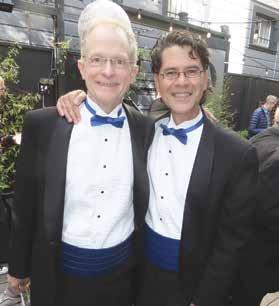

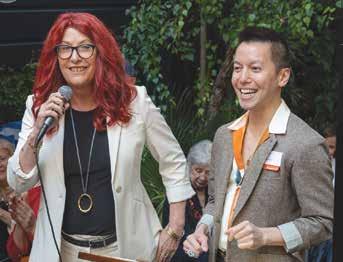
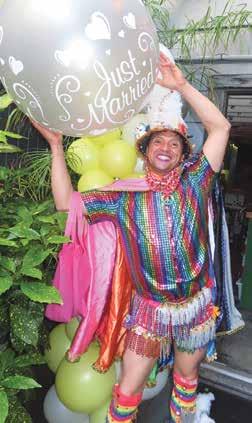
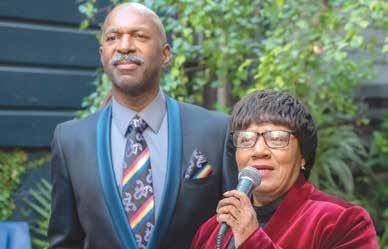
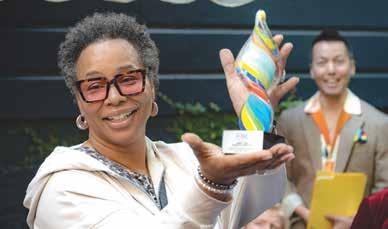



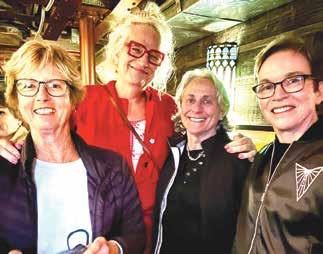
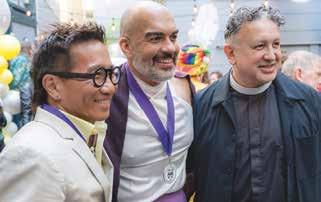

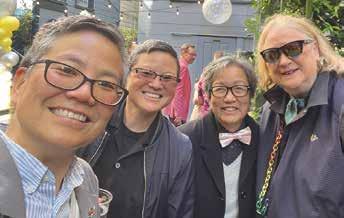
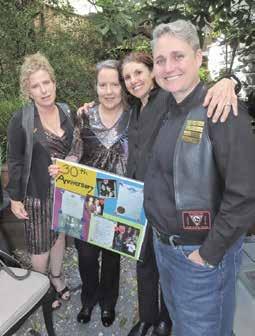


Tales From Two Wheels
With the 2025 June Pride activities in our rear-view mirrors, I reflect on the wonderful celebration of inclusivity, solidarity, and support for the LGBTQ+ community.
Pride Week for the San Francisco Dykes on Bikes® began Sunday, the 22nd, with the People’s March, an event that harkens back to Pride’s origins in protest and activism. Invited by organizers Alex U. Inn and Juanita MORE!, we created the safety perimeter, blocking vehicle traffic at intersections and helping eliminate the need for police presence for the March. Our BIPOC and POC riders proudly participated in the march, aligned with the March’s theme of centering Black, Brown, and Indigenous voices.
Many of us attended a fabulous Divas &
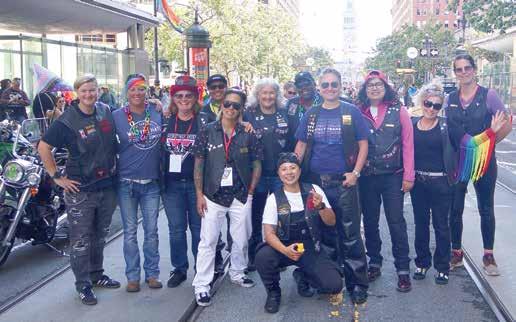
Drinks party on Thursday evening, June 26, at The Academy SF. It was the perfect kickoff to the Pride Weekend. The following night, San Francisco Dykes on Bikes carried the Rainbow Torch through downtown San Francisco to Harry Bridges Plaza, where Illuminate the Arts hosted a grand lighting of the world’s largest Pride flag at the base of the R-Evolution statue. Spanning over 4 miles, the laser rainbow filled Market Street from the Ferry Building to Twin Peaks with a lighting ceremony complete with music and bubbles (yes, bubbles) as people danced under the “Gaysers.”
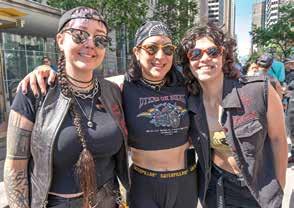
Saturday, we turned our attention to two things we love: throwing a party and raising money for activities that support our mission. Our annual fundraiser at The Academy SF was a tremendous success! Thanks to the generosity of our supporters, we raised $2,000 in donations to launch the Soni S.H.S. Wolf Riding Scholarship. Details about the scholarship will be shared on our website
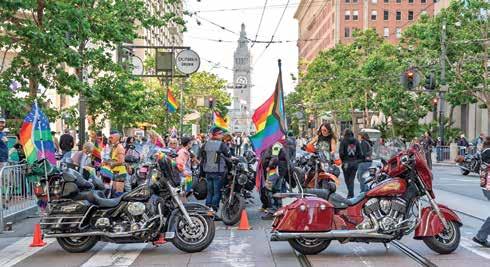
By Kate Brown, Ph.D.


also a hit, and we are proud to donate those proceeds to two community organizations: The Transgender District and El/ La Para TransLatinas.
The energy at the fundraiser was electric. Two winding roads were used as thermometers to chart our progress towards the $2000 goal. Huge thanks to The Academy SF for hosting our event, to the many local businesses who contributed to our silent auction, and DJ Rockaway for setting the perfect vibe.
Sunday morning, Dykes on Bikes Patch-holders, Prospects, and our team of dedicated volunteers were on Market Street by 7 am. The weather was perfect, and just shortly after 10:30 am, nearly 250 motorcycles and two U-Haul vehicles roared down Market Street, kicking off the San Francisco LGBTQ+ Pride Parade in true thunderous fashion. The ride was a powerful, visible, and joyful expression of queer pride. Thank you to everyone who joined us on Pride Sunday.
I am deeply grateful to our Board of Directors, Patch-holders, nearly two dozen tireless volunteers who join us on Saturday or Sunday of Pride Weekend, and our ever-growing community of supporters. Through weeks of planning, hauling gear, and gathering donations, your dedication made this year’s Pride celebration unforgettable.
Thank you for helping Dykes on Bikes® make another historic and proud ride down Market Street as we celebrated our 49th anniversary. With our 50th just around the corner, we’re already revving up for an even bigger celebration. Here’s to another year of bold visibility, roaring engines, and unstoppable pride!
Kate Brown, Ph.D., is the President of San Francisco Dykes on Bikes® Women’s Motorcycle Contingent. https://www.dykesonbikes.org/
Since 1974, the National Women’s Music Festival (NWMF) has celebrated and built a community of women who come together to share their talents, stories, energies, and knowledge all while enjoying music, art, comedy, and written/ spoken word performances. The 49th NWMF took place from July 3–6 in Middleton, Wisconsin. Susan Berston, an author and Professor of Business at the City College of San Francisco, attended and reported on the festival for the San Francisco Bay Times and also presented the 2024 documentary Sally!, about the radical lesbian feminist Sally Gearhart. Berston is the Executive Producer of this award-winning film directed by Deborah Craig.

ducing, writing, and performing music that brought a soul and R&B sound to the label.
Songs like her rendition of “Don’t Pray for Me” and “Freedom Time,” both collaborations with Mary Watkins, challenged homophobia head on and addressed feminism, racism, peace, and justice.

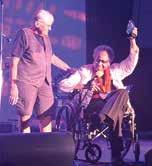
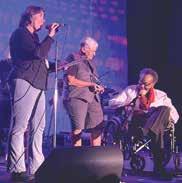
Many artists from the Bay Area attended and performed at the NWMF, including legendary singer Linda Tillery, who was presented with The Lifetime Achievement Award on July 4. This San Francisco native whose career spans more than 55 years is an out lesbian recognized as a pioneer and national treasure in women’s music. She is a Grammy-nominated vocalist, percussionist, producer, and cultural historian who has collaborated with June Millington, Deidre McCalla, Barbara Higbie, Holly Near, Margie Adam, and many others. She was the featured guest of the San Francisco Bay Times Pride Parade contingent a few years ago.
In 1975, Tillery began working with the lesbian feminist collective Olivia Records, pro-

Another memorable moment was the screening of Radical Harmonies (2002), followed by a panel discussion featuring Dee Mosbacher, filmmaker, lesbian feminist activist, and psychiatrist; Boden Sandstrom, University of Maryland lecturer; Tillery; Adam; Bonnie Morris, women’s history professor and author; and Megan Metcalf-Joyce, a lesbian librarian, queer historian and Women’s, Gender & LGBTQIA+ Studies Librarian and Collections specialist at the Library of Congress. Radical Harmonies: Woodstock Meets Women’s Liberation, produced by Mosbacher, is a full-length documentary that chronicles the Women’s Music Cultural Movement and its evolution.
A workshop entitled “Preserving Lesbian Herstory in Tough Times” featured Morris, who discussed information on archiving lesbian legacies and passing on personal festival collections. It is especially urgent as our community confronts new erasure by the Trump administration.
Plans are already underway for the milestone 50th annual NWMF. https://nwmf.info/
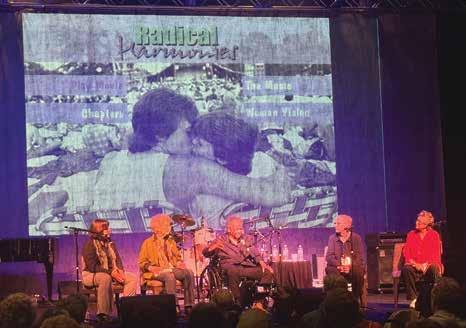

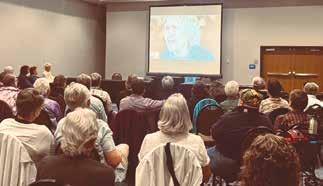
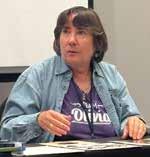
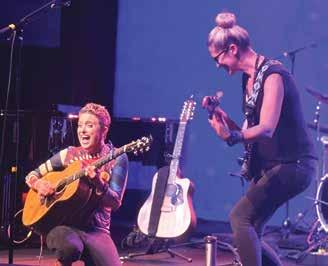


sexual orientation, and it is little surprise that he received a zero rating from the Human Rights Campaign in its report on the 177th Congress.
While Scalise fully backs the Rescissions Act, Rounds and Collins, along with Nebraska Senator Deb Fischer and Alaska Senator Lisa Murkowski, were among those who expressed concerns about it during a June hearing. President Trump sent the act to Congress in early June, which started the ticking down of the 45-day clock allowed for consideration of the act. This issue of the San Francisco Bay Times comes out during the final week of that 45-day period that could result in three possibilities: the Senate could approve the act as is, modify it, or allow it to expire.
An Act That ‘Will Have Grave Implications for the Congress’ The act is a relative drop in the money bucket compared to the expenses outlined in the One Big Beautiful Bill (yes, that’s really what it is called), which is now law. The bill, for example, includes more than $46.5 billion for border wall construction alone. The funds outlined in the Rescissions Act, in contrast, were already lean and meant to support democracy, global nutrition, the LGBTQ+ community, contraception access, HIV/AIDS prevention ... and that does not even take into account the funds earmarked for public radio and television.
Earlier this month, Senate Democratic Leader Chuck Schumer (New York) wrote a strongly worded letter to his fellow party members that captures the importance of this moment. He urged Collins and other more centrist GOP senators to reject the rescissions package and to instead work on bipartisan deals concerning appropriations for the 2026 fiscal year. Schumer warned that failure to do so would have long-lasting consequences: “How Republicans answer this question on rescissions and other forthcoming issues will have grave implications for the Congress, the very role of the legislative branch, and, more importantly, our country.”
SAVE PUBLIC MEDIA (continued from pg 2)
support for PBS. As the organization holds, “Now it’s our job to speak up and make sure the Senate hears us: pulling back support from local stations would leave communities less safe, children less prepared for school, and all of us less connected.”
No matter what happens with the act, both PBS and NPR need support from those who can afford it. Each individual who donates is helping pay the way for countless viewers and listeners who are less fortunate and who rely on the programming. Several studies reveal that there is a powerful link between literacy and children’s media, for example, with a large percentage of children learning how to read with high-quality, evidence-aligned instruction, and many PBS programs are designed to be part of that effort.
PBS/EVOLUTION (continued from pg 3)
involvement seems worlds away from Trump’s accusation that PBS and NPR programming is “politically biased.” The effort to silence public media is itself biased. President Trump has called PBS and other major media outlets the “enemy of the people,” which is what Soviet dictator Joseph Stalin leveled against those who dared to oppose him.
PBS has had the backs of the LGBTQ+ community for years. It is time to pay it back to this most prominent provider of educational programs in the U.S.
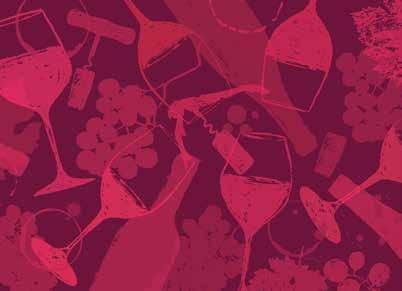
with collective action.
The beauty of AIDS Walk is that at its heart it is a grassroots event where everyone can participate, no matter whether you raise $5 or $100,000, whether you can walk the full route or are “walking” virtually from your living room. Smaller organizations that serve the HIV and AIDS communities—some of which can’t afford to have a development department—can raise money through AIDS Walk that might be difficult for them to do on their own. And for those smaller organizations, whatever they raise through AIDS Walk, however modest, can make a big difference in their ability to continue providing vitally needed services.
Join us for a day of community and joy in Robin Williams Meadow in Golden Gate Park on July 20. Sections of the AIDS Memorial Quilt will be on display as a powerful reminder of all those who died in this pandemic, but also of the community’s compassionate response.
To become a walker, form a fundraising team, or make a donation to support any walker or team, go to: https://sf.aidswalk.net/
Some Good News Regarding HIV and LGBTQ+ Funding
Finally, some good news: the California Legislature and Governor Newsom backfilled federal HIV prevention funding cuts. This action prevents harmful cuts to programs that serve the HIV and LGBTQ+ communities. The state budget also allocates $75 million from the AIDS Drug Assistance Program (ADAP) Rebate Fund to cover projected cuts in federal HIV funding, continue the vital work of disease investigation specialists, and fund new hepatitis C testing equipment. You can read the full announcement from the San Francisco AIDS Foundation here: https://tinyurl.com/CAFunding Local Writers Featured in Children of Lazarus
In April 2020, just one month into the COVID lockdown, San Francisco writer Hank Trout called Gregg Cassin at Shanti, because Gregg’s program,
ROSTOW (continued from pg 9)
hear a separate challenge, with a separate argument, from parents. Now the Court has rejected the Tennessee parental rights case (along with another from Kentucky), tossing the mothers and fathers of transgender children under the bus while bending over backwards to make sure religious parents don’t have to expose their kids to a handful of innocuous stories about gay people.


At the same time, the justices sent four transgender victories back to the lower courts for reconsideration in view of their nasty piece of work in Skrmetti. That signals that the lower courts are expected to reverse themselves and nullify the successful outcomes. The U.S. Court of Appeals for the Seventh Circuit took immediate action by vacating its most recent trans-friendly high school bathroom ruling.
And the big new case? You knew it was coming. The High Court has decided to take two cases concerning transgender sportswomen, one out of Idaho and one out of West Virginia. The laws against transgender athletes were shelved by the Ninth Circuit and the Fourth Circuit respectively, citing the Constitution and Title IX’s ban on sex discrimination in public education. Considering we will be returning to these cases and this subject repeatedly for the next year,
Honoring Our Experience, had become a force for creating community and support for long-term survivors. Recognizing the power of storytelling to combat isolation and build community, Hank suggested bringing people together on Zoom to write their stories of the AIDS pandemic, as they were now facing a new pandemic. The initial writing group included men and women, HIVpositive and negative, gay and straight, with the common ground being that they had all lived through the trauma of the early years of the AIDS pandemic. They met on Zoom each week to talk, and to write—even though several protested, “But I’m not a writer!” From those weekly sessions not only was a community born, but also several participants found their voices as writers.
Some of those writers are featured in a new anthology, Children of Lazarus: The Forgotten Generation of Long-Term AIDS Survivors. The editor, Les K. Wright, was concerned that as the AIDS generation is getting older, their history would be lost. The writers featured in the anthology share their stories with power and courage, and the book is a worthy addition to the literature of the AIDS pandemic. https://tinyurl.com/ChildLaz
One
Here is a concrete way to support our immigrant neighbors. You can sign up with Faith in Action Bay Area to accompany someone to an ICE Check-In or Court Hearing. In San Francisco, these usually occur between 7:30 am and 3 pm. Please only sign up if you have availability during the weekday, and can get to downtown San Francisco. Your presence at these events really can make a difference. Sign up here: https://tinyurl.com/FICacc
Joanie Juster is a long-time community volunteer, activist, and ally.
let’s not pursue the details right now. It looks as if the Court is methodically mowing down the hard-fought legal precedents we’ve worked to achieve in the last quarter century, cementing anti-GLBT legal presumptions into American jurisprudence for a generation to come.
I’m a boomer, so my time has come and gone. We have walked with Xers up a laborious path, making progress bit by bit. We’ve had victorious moments; the end of sodomy laws, the legalization of same-sex marriage, and most importantly, the rise of national majority in support of our civil rights. I don’t believe marriage equality can or will be rolled back, but I do believe this Court will chip away at it by allowing “faithbased” objectors to refuse to acknowledge us without facing the civil rights laws we worked so hard to put in place.
The rest of our accomplishments are being trashed by the three branches of government as I write. I’m not sure what our Millennial and GenZ compatriots can do to slow the hateful momentum, but I applaud whatever they come up with. For starters, we can get one of those branches back on our side in 2026.
arostow@aol.com
Photos by Jack Persons Photography and the Alice B. Toklas LGBTQ Democratic Club
Democratic party activists, elected officials, and supporters filled the Ballroom at the Hyatt Embarcadero on Sunday morning, June 29, 2025, for the Alice B. Toklas LGBTQ Democratic Club Pride Breakfast. It is held each year just prior to the start of the San Francisco Pride Parade.
Noting that this year’s event was the largest postCOVID Pride Breakfast to date, the club’s Co-chairs Olivia Parker and Martin Rawlings welcomed attendees and thanked as well the record number of sponsors supporting the event.
Representative Sarah McBride of Delaware, the first openly transgender member of Congress, was the featured speaker, along with Oakland Mayor Barbara Lee, State Senator Scott Wiener, San Francisco Supervisors Rafael Mandelman and Matt Dorsey, and Gwendolyn Ann Smith, Co-founder of the Transgender Day of Remembrance.
https://alicebtoklas.org/
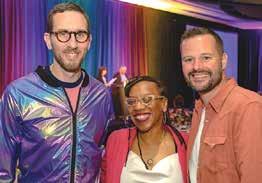
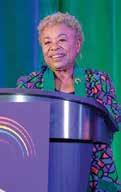

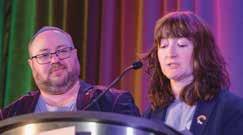
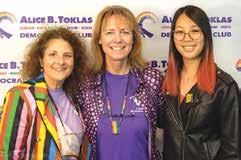
San Francisco’s Trans March 2025, which took place on June 27, drew thousands of participants. As the San Francisco Office of Transgender Initiatives, led by Director and San Francisco Bay Times columnist Honey Mahogany, reported: “Transmarch 2025 was vibrant and magical! Over twenty-five thousand transgender and gender diverse community members and our allies marched from Dolores Park to the site of Compton’s Cafeteria Riot, demonstrating San Francisco’s dedication to trans liberation.”
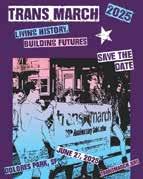
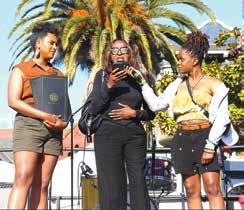
Janetta Johnson, Executive Director of the TGI Justice Project, and activist, coach, and writer Fresh “Lev” White were presented with proclamations on behalf of the City and County of San Francisco in honor of Trans Elders Day to celebrate their leadership and dedication to the community.
https://www.transmarch.org/

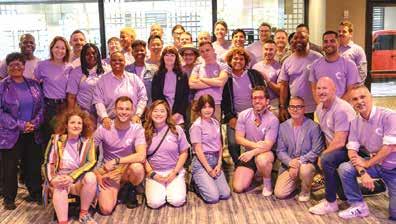
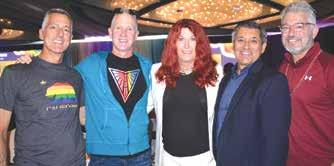
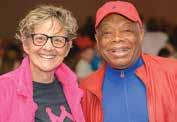

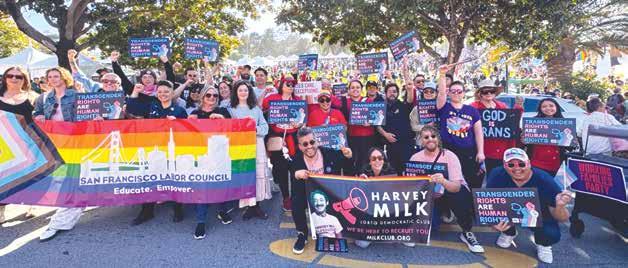
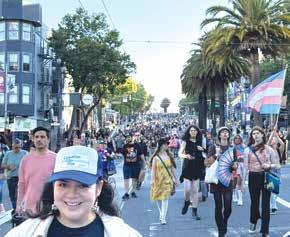
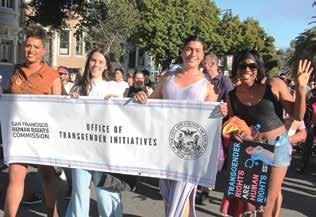

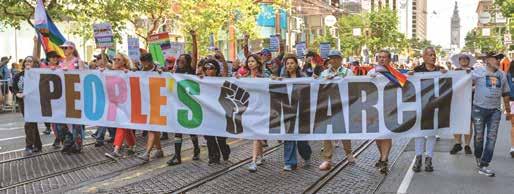
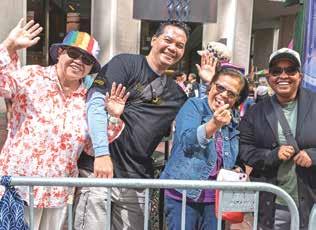
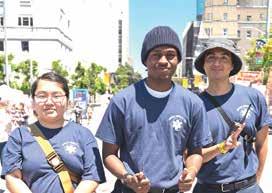

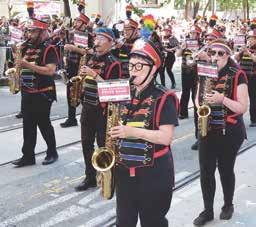
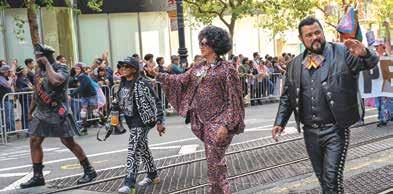
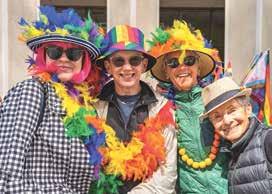
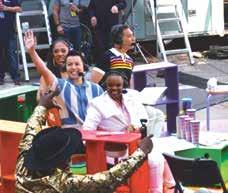
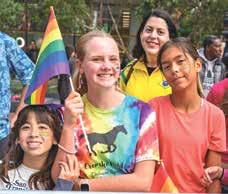
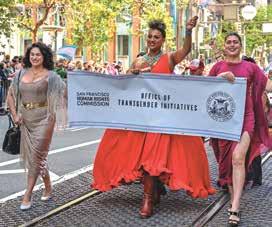
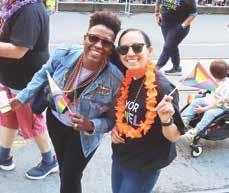
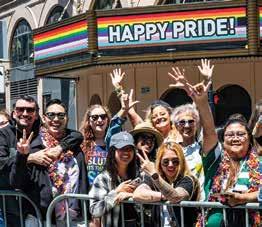
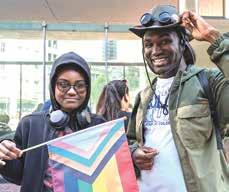
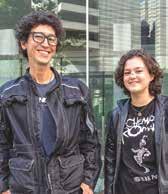
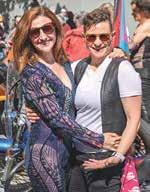
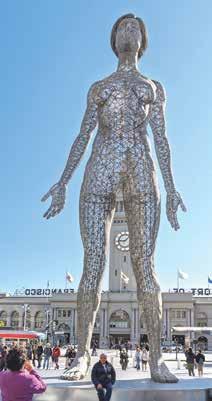

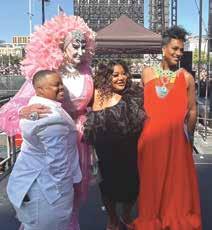


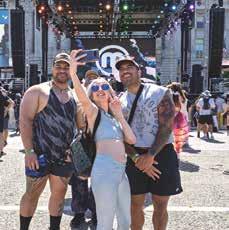

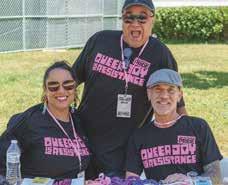

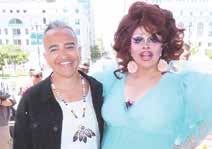
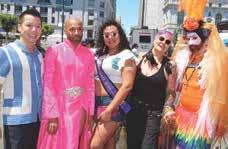

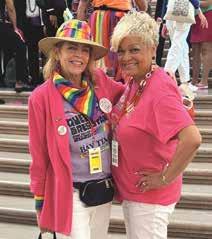
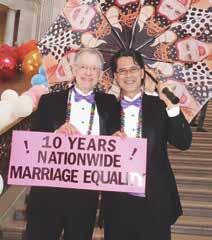
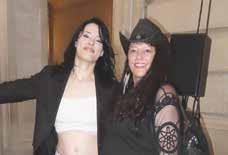
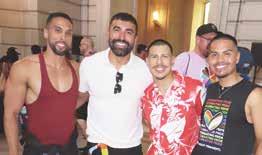

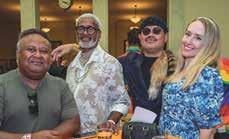
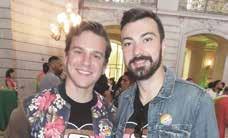
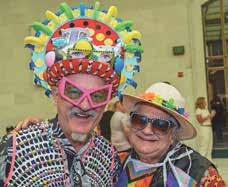

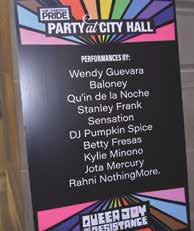



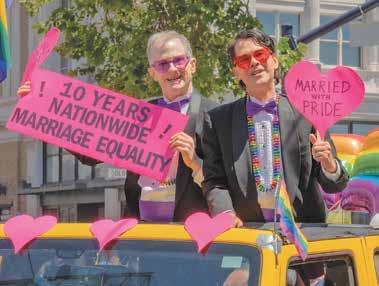
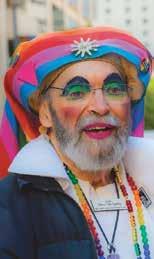


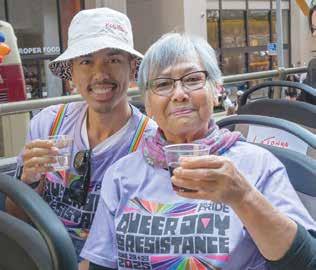

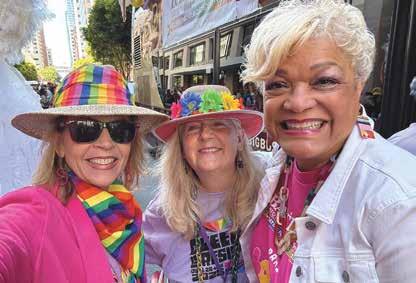
The San Francisco Bay Times, a longstanding Official Sponsor of San Francisco Pride, returned for 2025 with a strong mix of veteran contingent members and newcomers.
To honor the 10th anniversary of nationwide marriage equality, the contingent highlighted Marriage Equality USA leaders and Bay Times columnists John Lewis and Stuart Gaffney, along with filmmakers Geoff Callan and Mike Shaw who co-directed the 2005 award-winning documentary Pursuit of Equality
Lewis and Gaffney rode in a brightly colored Jeep Wrangler owned and driven by Larry Pascua. Callan and Shaw rode in a classic Alfa Romeo convertible driven by Jeff Morin. Both vehicles were festively decorated by Sparky’s Balloons with giant rainbows made out of balloons. Video taken by Shaw while in the parade is at: https://bit.ly/44FkCW5
Patrick Carney, creator of the Pink Triangle project, was also in the Bay Times contingent along with his husband Dr. Hossein Carney and at least one of their many dedicated volunteers.
Additional honored guests included drag legend and Bay Times columnist Donna Sachet, who for many years co-hosted the television coverage of the parade. Bay Times founding news editor Randy Alfred also joined the contingent, as did Out & Equal founder Selisse Berry, and Bay Times columnist and one of the longest serving members of the Sisters of Perpetual Indulgence, Sister Dana Van Iquity. Sister Dana always sits on the right side of the bus and blows kisses to paradegoers!
Mai Dam, the mother of San Francisco Pride President Emeritus Nguyen Pham who co-hosted the ABC7 coverage of the parade, was yet another honored guest. She was joined by her son, Andy, and both waved enthusiastically as the contingent went in front of the ABC7 broadcast booth. Pham, who is also the current President of Mensa, noticed and gave a shout out to his mother and brother while live on the air!
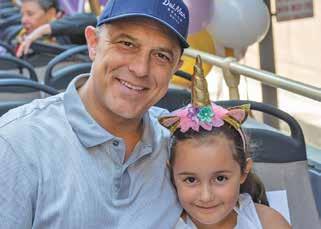

Grubstake’s Jimmy Consos and his daughter Eleni were also in the Bay Times contingent, which included individuals from multiple generations ranging from grandparents to kids like young Eleni. Others aboard included LaTonya Lawson, Beth Schnitzer, interna-
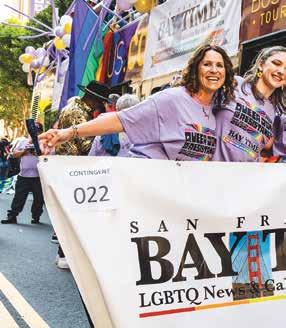
tionally acclaimed taiko drummer Tiffany Tamaribuchi, photographers Bill Wilson and Jerry Palmer, and numerous others. The Bay Times lead photographer, Rink, was on Market Street throughout the parade.
Trinchero Estates assisted with the Bay Times beautiful lavender t-shirts—a nod in color to the Golden State Valkyries Thanks go to Joe, Monette, and Savannah Shirley who provided much-appreciated beverages to contingent members both before and during the parade.
Big Bus Tours provided the contingent’s double-decker, the same one used in past Warriors victory parades. It is little wonder that these vehicles are ubiquitous in San Francisco, as they are comfortable and allow for incredible views of the city. Their tours are highly recommended, and members of the Bay Times team even enjoy going on them from time to time as staycations and reminders of so many of the remarkable landmarks that residents often take for granted. The Muir Woods + Sausalito Tour is a great deal that includes admission to the woods in the already reasonably priced ticket.
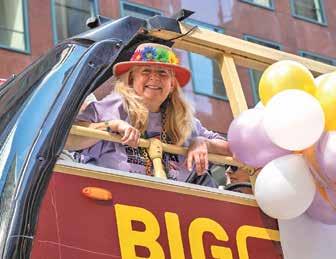

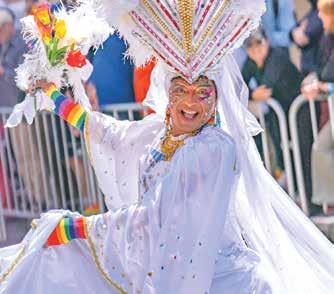
Thanks to ellaprint for handling the signs and other printing services. Sparky’s Balloons, in addition to decorating the two spotlight convertibles, creatively decorated the giant Big Bus too. The San Francisco Giants was a co-sponsor of the Bay Times contingent, stepping up to the plate for not only the parade but also for other Pride-related activities this year. DJ Rockaway presented by Olivia Travel kept the music flowing.
The Bay Times contingent would not be possible without the dedicated work and creativity of veteran contingent managers Juan Davila, Leticia Lopezz, Warren Alderson, Steve Scheitlin, Karen Bardsley, Jade Martner, and Linda Schomaker. Plus, there were many other “regulars” who know the parade route by heart and bring along good cheer and youths to help carry the Bay Times banner at the front of the contingent.
Sincere thanks also to San Francisco Pride’s Suzanne Ford and the entire team of dedicated pros who make the Pride Parade happen with expertise and care. Congratulations to all in the SF Pride family for this year’s success and for their invaluable support and friendship.
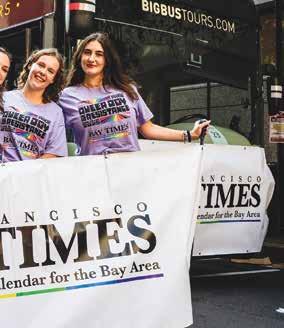
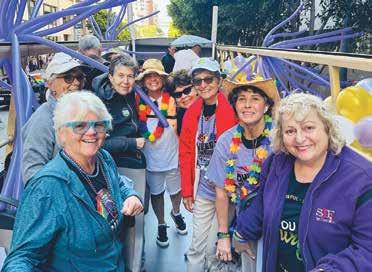

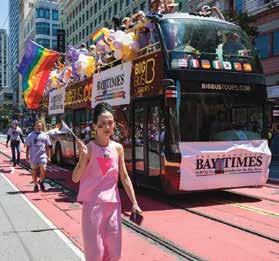

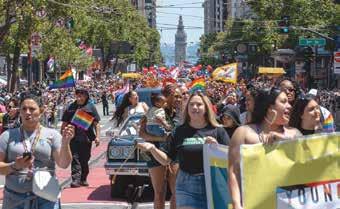
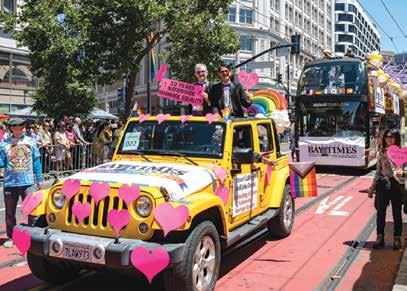
Attend San Francisco Dyke March 2025, the First Official Such March in
After a six-year reorganization period, the San Francisco Dyke March returned for 2025 as strong as ever with an estimated 20,000 participating. The theme this year was “Dyke Solidarity, Dyke Resistance,” and both were in view on the afternoon of Saturday, June 28.
Marchers first gathered at Dolores Park before stepping off for the march at 18th and Dolores streets. Speakers at the rally included members of Bay Area American Indian TwoSpirits, Imani Rupert-Gordon of the National Center for Lesbian Rights, The Curve Foundation’s Franco Stevens, Celestina Pearl from Lyon-Martin Community Health, Crystal Mason from Tree of Change, Ms. SF Leather 2025 Madam Folly, Trinh Lê from the Bay Area Lesbian Archives, and more.
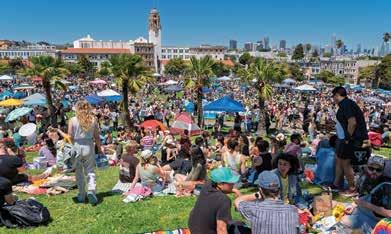
The emcees for the afternoon were Alotta Boutté and Aïma the Dreamer. There were performances by Skip the Needle, Marga Gomez, Tammy Hall with Lambert Moss, Velvetta (Lite), Black Gold Sun, Doctora Xingona, the Mya Byrne Band, and others.
The primary sponsors for this year’s march were Lyon-Martin and The Curve Foundation. The organizers as of this writing and led by Interim Project Director M Rocket still need another $30,000 to reach their fundraising goal, to break even, and to set the stage for next year’s march. Help out with that effort at: https://bit.ly/3GEaweM
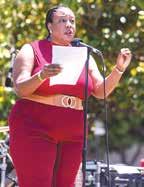
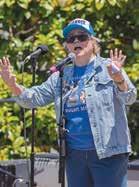


Foam Party Wig
It’s party season! No time to shake out your wig? Throw on a foam party wig and skip the hairspray. We’ve got updos, bobs, Marilyns, and more! Starting at $42.99 each.
Bring your own seat with this amazing compact portable telescoping stool with a weight capacity of 285 pounds. Available in assorted colors. $24.99.

Keep up with Cliff’s Variety news at Facebook ( https://www.facebook.com/CliffsVariety ) and Instagram @hilario_sf
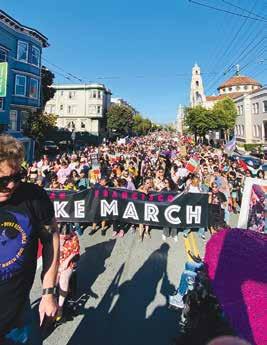

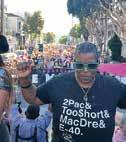
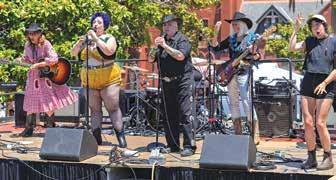
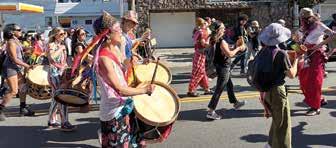
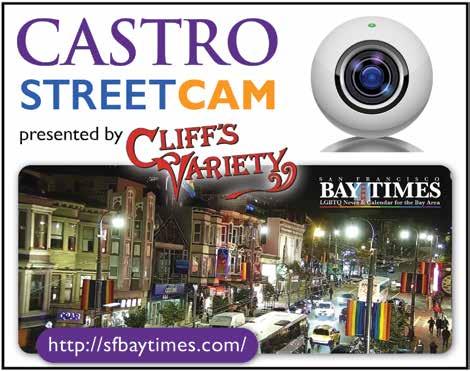

The San Francisco Bay Times contingent includes a team of experienced leaders who help make everything run smoothly. Newcomers also came to assist this year, evidencing “many hands make light work” and benefiting all in the contingent.
Among the longstanding team members were Carol Steinkamp, Sally Ann Nichols, Sandy Linton, husbands Brent Hensley and Frank Marx, and many more. Thanks also to Selisse Berry, President of the Rossmore Lesbian Social Club, and longtime friends Linda Phillips and Misha Cohen who represented the Del & Phyllis Posse (named after the late great Del Martin and Phyllis Lyon, who were the OG lesbian activists.) The Bay Times team also welcomed back longtime associate Kate Laws and her guest Tara Thomas.
The Bay Times mighty photography team this year, led by Rink, included Bill Wilson, Mike Kirschner, and Jerry Palmer.
Thanks go to the spectators who cheer the Bay Times contingent every year; to Sister Merry Peter, chair of the parade contingent judges, who warmly greets the Bay Times team; and to the ABC7 Pride coverage crew with anchor Reggie Aqui and community commentators Carolyn Wysinger, who is the Mayor of El Cerrito, and Nguyen Pham, who is the President of Mensa.
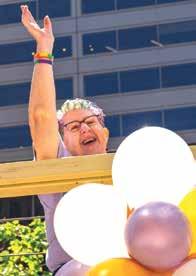
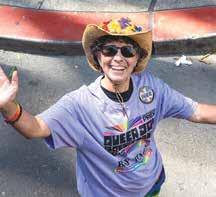
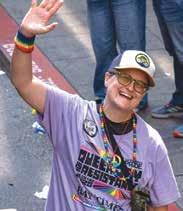


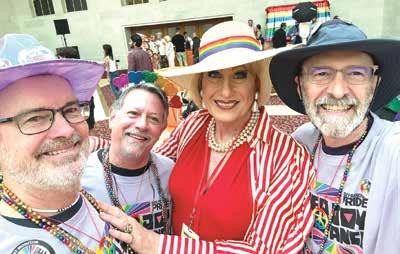
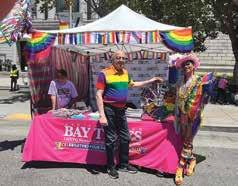
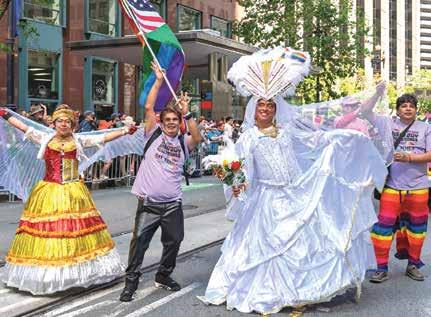
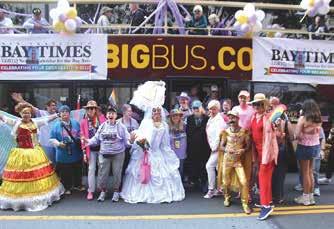
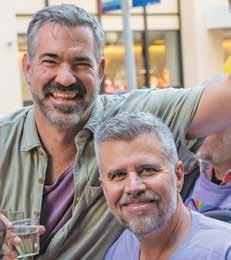





Sincere appreciation to Andrew Smith, Nicole Ritthaler, and the entire team of drivers and customer service representatives! The San Francisco Bay Times’ year-round partnership with Big Bus Tours means so much to us and is truly indicative of the company’s commitment to the LGBTQ community.
Please consider enjoying their tours of San Francisco and the Bay Area any time you have guests coming from out of town or if you want to see the sites of our fabulous city while celebrating any occasion. www.bigbustours.com
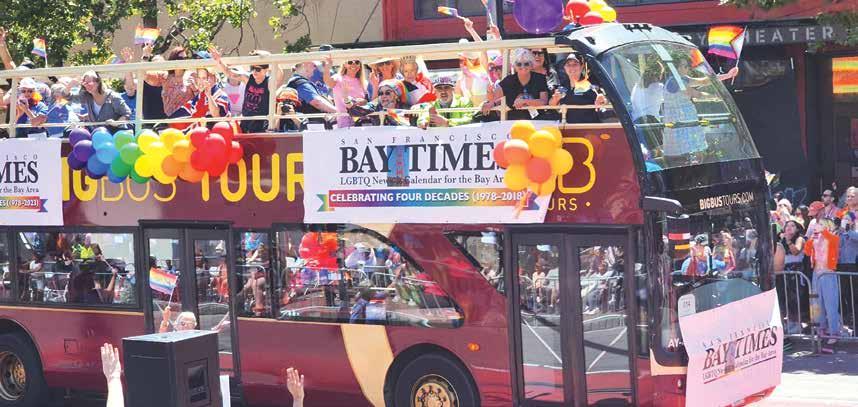

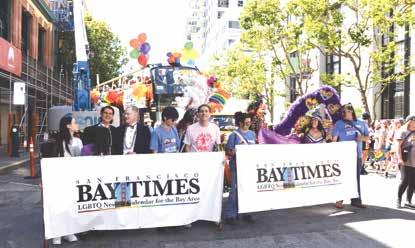




The San Francisco Jewish Film Festival (SFJFF), July 17–August 3, features more than a half dozen features, shorts, and documentaries about LGBTQ life, including 31 Candles, an amusing Bar Mitzvah comedy with a slight queer twist; Heightened Scrutiny, about trans advocate and activist Chase Strangio arguing the Supreme Court case, United States v. Skrmetti, about banning gender affirming care in Tennessee; and Monk in Pieces, a striking documentary about the celebrated queer interdisciplinary artist, Meredith Monk.
Other queer-themed features include Midas Man, an entertaining character study of Brian Epstein (Jacob Fortune-Lloyd), the gay man who is credited with discovering the Beatles; and Come Closer, an intense drama about Eden (Lia Elalouf), who becomes romantically involved with her dead brother’s secret girlfriend, Maya (Darya Rosenn).
Ash Hoyle, the festival’s director, and Dominique Oneil, a programmer, both of whom are queer, spoke with me for the San Francisco Bay Times about this year’s lineup.

Gary M. Kramer: What are your criteria for curating films for this festival? Is it the content, the Jewish focus, or something else? What is the goal with your programming?
Ash Hoyle: For us at SFJFF, [what] we’re looking to do with the program is expansion. For the length of our 45-year history, we’ve done a good job of providing a kaleidoscopic understanding of what is on the mind of the Jewish artist and Jewish culture at large. What that takes is a really broad, multifaceted, sometimes contradictory, and always really open approach to what we want to touch on editorially. That is our curatorial posture. It’s about absorbing the submission pool and getting a pulse on


what is being discussed and on the minds of artists and then shaping a program that feels cogent and urgent and meets the moment.
Gary M. Kramer: What can you say about programming the queer films in this year’s festival? Some of the films at the Jewish Film Festival screened at Frameline last month. Are there concerns about overlap, or exclusivity and premieres? Or is your mission to give folks another opportunity to see these films?
Ash Hoyle: We share an office and a city with Frameline. It’s cool and exciting to have overlap because it shows the intersection of queer life and Jewish life in San Francisco.
Our audience is really different. With Heightened Scrutiny, queer folks and close allies saw that at Frameline and hopefully we will be expanding that to people who will learn something and have their minds changed. Sharing titles is great and not being precious about premiere status is a service to the larger film community. We have world premieres. There is a balance of fresh and new and we are looking in a less black and white way on how the presentation of other works can add to the conversation.
Dominique Oneil: We are excited about audiences coming out for films, so if we can give another opportunity for people to see the works of these artists who have something to say, we want to do that, especially for these films that mean something and are important for our time.
Ash Hoyle: A large majority of the films in our festival don’t have wide distribution, so there is no other way to see them. It is a good thing to give audiences more chances to catch them in San Francisco.
Gary M. Kramer: Heightened Scrutiny, which chronicles trans advocate and activist Chase Strangio arguing the December 2024 Supreme Court case, is part of the “Take Action” spotlight. Can you talk about the festival having political power?
Ash Hoyle: This film, as you mentioned, is in our “Take Action” spotlight, which we carve out in the festival to tap into larger zeitgeist conversations that fit under the umbrella of the Jewish principle of tikkun olam. With programing, there is a careful balance of looking at the landscape of what’s happening in the culture right now and trying to find films that plug us into what we know audiences want to talk about. The Supreme Court case [the film is about] was decided definitively since we announced our program. It is an obvious urgent political issue people care about within the Jewish, queer, and San Francisco communities. Sam [Feder the director] is a Jewish anti-Zionist filmmaker. This film, while not directly addressing Jewish issues, has that sensibility. It is also to encourage audiences to expand their ideas of what a Jewish film is. It is important cultural matter made by one of the most influential trans masculine and Jewish voices in the documentary world working today.
Gary M. Kramer: You are also featuring a conversation with Tommy Dorfman. What can folks expect from attending that program?
Ash Hoyle: It’s not a screening-focused event. We want to offer audiences a variety of experiences beyond just a screening. It’s a way to reach someone who is an important cultural voice in the trans space and the Jewish space, both in Tommy and her conversational partner, Laura Albert, a legendary literary icon, and also an interesting complicated Jewish voice as well. They will be reading from Tommy’s memoir and talk about her book. They straddle the literary and film worlds. It’s exciting to expand our festival event framework to plug those people in.
Gary M. Kramer: You feature a local short, Thanks, Babs!, a documentary portrait of a vibrant queer octogenarian. How much does a Bay Area connection weigh into your decision to program something?
Dominque Oneil: We are lucky being situated in the Bay Area. We have a very vibrant and large filmmaking community. Each year we have a number of local films
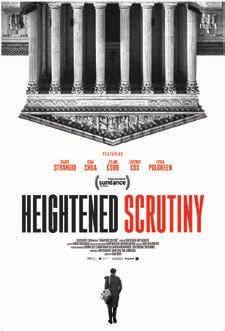
to consider. Babs is this amazing effervescent character. She is having the gayest time. She is a total icon; a diva. We all need this energy. We are expecting her to join us and the directors, Rivkah Beth Medow and Jen Rainin, will also be there. Thanks, Babs! is a film that happens to be local, but really shines on its own.
Gary M. Kramer: One selection this year is The First Lady, a documentary about Efrat Tilma, the first transwoman in Israel. The film is a celebratory look back at her life, her struggles with persecution and transphobia, and trouble with the police as well as her accomplishments, such as becoming the first trans police officer. What excited you about this film?
Dominique Oneil: I appreciated Efrat’s story, which is about finding your place in the world through resilience and resistance. It captures her 70-odd-year journey of fighting for and securing rights for herself and others. Along the way she is evaluating and adapting to the discrimination she faces. It is specific to her life as a trans Israeli Jew. On top of that, she’s hilarious. The film is supported through the Jewish Film Institute though our residency program. The director developed the film in their residency last year.
Gary M. Kramer: You do feature a few fun queer films—Midas Man, about Brian Epstein, who discovered the Beatles, and 31 Candles, an adult Bar Mitzvah comedy. Can you talk about striking a balance in the programming?
Ash Hoyle: Hopefully people will encounter something they like, or are interested in, or are challenged by. What is exciting about gathering all these films and filmmakers together is offering a variety. That is what our audience wants. They are hungry to have their intention filled—have a laugh on a Friday night or are interested in a topic academically. People come to film festivals to have their world views expanded and their taste challenged. We want you to encounter things you don’t while scrolling
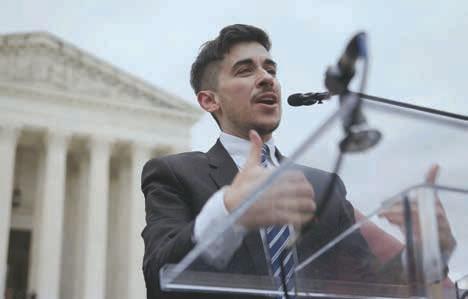
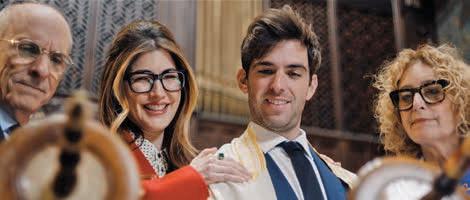

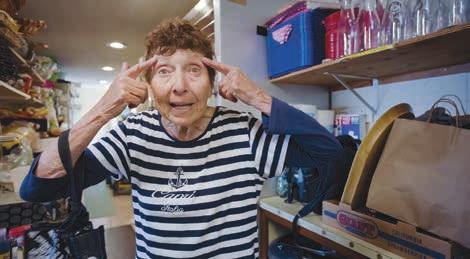
through streaming services at home. That’s why audiences come, to make choices beyond the obvious or first impulse. As programmers, it is our responsibility to feel that hunger.
Gary M. Kramer: What films do you encourage audiences to see?
Ash Hoyle: The Divine Sarah Bernhard. It happens to be queer. It is a period drama about Sarah Bernhard that is way funnier and way sexier than you’d expect on a historical figure.
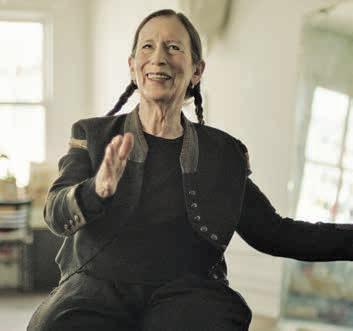
Dominique Oneil: I would recommend Rule of Stone, which is not a queer film, but it is a film I really took away a lot from about how Jerusalem was built. It’s about architecture, which is not an easy sell, but it is about so much more—cultural appropriation in Jerusalem, and coexistence, and the erasure of two cultures. I’m more of a serious documentary person, which is where that is coming from. But I can also recommend a queer film, Monk in Pieces, which is a documentary about Meredith Monk. This is another JFI supported film. Meredith Monk is so unique in her vocal stylings. It is something I had never heard
before, and this film captures all of that and makes it make sense such that it really resonates. She is totally weird and super relatable. It was a really enlightening film—a music bio doc that didn’t feel like a music doc.
© 2025 Gary M. Kramer
Gary M. Kramer is the author of “Independent Queer Cinema: Reviews and Interviews,” and the co-editor of “Directory of World Cinema: Argentina.” He teaches Short Attention Span Cinema at the Bryn Mawr Film Institute and is the moderator for Cinema Salon, a weekly film discussion group. Follow him on X @garymkramer
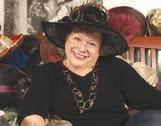
Jan Wahl
Have you ever waited a week to see your favorite series episode?
I am going quite insane because of HBO’s The Gilded Age. It is something I watch twice: the first time for the characters and the drama, and then I watch it again for the sets and the costumes.
Costume designer Kasia Walicka Maimone puts together over 1,200 women’s dresses, 1,000 men suits, 750 women’s hats, 400 men’s hats, 100 tiaras, and 4,000 pairs of shoes for the series. Creator Julian Fellowes (Downton Abbey), keeps it all authentic to the actual Gilded Age of New York City from 1877–1900.
Maimone explained, “We looked at endless amounts of historical paintings, actual clothes from museums, and I was determined to create a distinct look for each character.”
The hats alone are the stuff of my dreams.
The series features a closeted gay man, Oscar van Rhijn (Blake Ritson.). In Fellowes’ other hit series, Downton Abbey, there was Thomas Barrow the butler. While Barrow suffers and self-hates, Oscar van Rhijn is arrogant and self-interested. I hear he meets Oscar Wilde soon. Gay women, in turn, lived together and often wrote passionate poems to each other.
The disparity of wealth in Manhattan at this time, the late 19th century, is rather insane, with the extravagant living it up. But go along for this gorgeous and crazy ride! If you don’t have HBO, you can watch it on MAX, DirectTV, or Hulu.
I am also obsessed with Turner Classic Movies (TCM). Recently I didn’t move for two hours while watching Garbo (2005) hosted by TCM. Hollywood historian Kevin Brownlow, and narrator Julie Christie highlight this remarkable actress along with my friend, cinema historian Mark Viera.
I learned that Garbo was the most mystifying actress in film history and completely did it all her own way. We end up understanding why she had to turn her back on Hollywood. It’s on both Netflix and TCM.
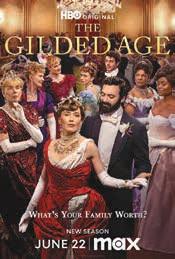
It takes four to six weeks to create one dress. Every sleeve, bustle, and bow are just right, and every button and fabric fit the time period. Aside from the dresses, no women of high society would dare be seen without intricate hats, elegant jewelry, stylish shoes, and long gloves.
It was a time of great political corruption and wealth inequality, but the rich really lived it up. There is old money versus new money and you will easily find your favorite character. Mine is Morgan Spector as George Russell, and I also like Carrie Coon (The White Lotus) as Bertha Russell. Cynthia Nixon as Ada Brook and Christine Baranski as Agnes van Rhijn are sisters who bitch as much as Bette Davis and Joan Crawford did back in the day.
Since it is summer, I head to my favorite author, William J. Mann, and his 1998 classic Wisecracker: The Life and Times of William Haines, about one of MGM’s biggest stars in the late 1920s. Haines played cocky, sympathetic wise guys, and everyone loved him. But he refused to hide his homosexuality and was thrown out of the studio in 1933.
Unlike many people, he had a fabulous second act—becoming an ultra-successful interior decorator. Mann links Haines’ story to shifting attitudes in the movie industry. There is also a beautiful love story of his companion from 1926–1973. This is one of those books you read more than once, like rewatching The Gilded Age, and every time get a new perspective.
Jan Wahl is a Hollywood historian and film critic on various broadcast outlets. She has two Emmys and many awards for her longtime work on behalf of film buffs and the LGBTQ community. Contact her at www.janwahl.com


An email exchange with scholar and writer Heather Petrocelli about the film Sinners by Ryan Coogler sent us on many different inquiries. One was to think about the significance of having the primary vampire in the film be Irish in his meditation on Black, Southern culture in the early part of the twentieth century. Aside from the benefit of the film having some really great blends between Irish and African American music, I wanted to know if there was a deeper meaning.
Then we considered the (under)use of members of the Choctaw Nation in the film. The film begins with an intriguing bang—with the tribal members hunting down the vampire leader—but then they completely disappear from the narrative. Their appearance alongside the fleeing Irish vampire villain, however, made us both remember the bond fostered between the Choctaw and the Irish in the 1800s.
Members of the Choctaw tribe took up a collection from their members that they donated to the Irish to stave off their

starvation during the Great Potato Famine, which was aided and abetted by the colonial forces of England. Recently having ended their forced march on the Trail of Tears, Native Americans were sunk into poverty, but their empathy led them to a kind of generosity that is hard to find in official U.S. circles today.
Almost two hundred years later, citizens of County Cork, Ireland, erected a monument called Kindred Spirits to celebrate the generosity of that Native American tribe. During the recent pandemic, the Irish collected and donated $1 million to Native American nations to support Coronavirus care. The Choctaw unveiled in 2023 their monument, Eternal Heart, to celebrate the enduring connection between the geographically distant yet spiritually connected peoples.
Our vice president—oops, I mean our apartheid-raised, white, South African,
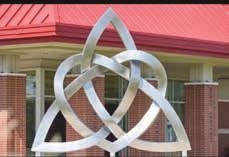
non-elected official, Elon Musk—claims “the fundamental weakness of Western Civilization is empathy.” He may have hit on a core idea, but got it totally backward: lack of empathy is at the root of every conflict, murder, rape, or assorted violent assaults perpetrated by humanity. It’s the deliberate obscuring of that empathy by manipulative powers that turns one person against their neighbor for obscure or mythological reasons.
When I was growing up in Boston in the 1960s, I attended one of the poorest high schools in the state; it was a mix of African American, Italian, Chinese, and the Irish poor all sitting together with inadequate text books. There was our headmistress (I know, weird title, right?!) Miss Casey and the lovely colleen, Gerry G, who sat in front of me because of the spelling of her last

The Bewitching (fiction - hardcover) by Silvia Moreno-Garcia
The best-selling author of Mexican Gothic, Silvia Moreno-Garcia, has returned with a new Gothic horror novel. The Bewitching is an eerie, multigenerational saga full of witchcraft, dark academia, and Mexican folklore. This is a novel you’ll devour in one sitting.
The Girls Who Grew Big (fiction - hardcover) by Leila Mottley
The Girls Who Grew Big is a thought-provoking novel about a group of young women known as The Girls. The Girls are all teenage mothers trying to graduate high school, care for their children, and navigate adulthood. Mottley writes in a way that does not romanticize but rather shows the value of these women.


Art Above Everything (non-fiction - hardcover) by Stephanie Elizondo Griest

Elizondo Griest meets 100+ artists in this exploration of whether her quest to become an artist is enough. She goes on to introduce these queer, female, and BIPOC artists as they explain what their art means to them, what it teaches them, and what it costs them. Artists from around the world are featured.
Upcoming Events
Sunday, July 20 @ 2 pm (non-ticketed - SF Ferry Building store) Alex Pavlovic, author of The Franchise: SF Giants: A Curated History of the Orange and Black
The Franchise: SF Giants: A Curated History of the Orange and Black is a collection of essays that takes readers on a journey of the history of the San Francisco Giants. Pavlovic will be joined in conversation with the Giants in-game host, Anthony Garcia.
name. She had the most brilliant green eyes I’d ever seen and sparked the melody of the song in me anytime I saw her. Truth be told, I can still sing it whenever I think of her! Crush much?
In the 1970s, the working class and poor Irish of South Boston were easily manipulated into forgetting how we’d sat together in schoolrooms in other parts of the city a decade earlier. Many were fooled into believing that working class African Americans who wanted to attend better schools were going to do them out their homes and jobs. The empathy that might flow between the two groups was short-circuited, precipitating ugly violence against young Black students.
It is this virus that our current administration is spreading among the population in the U.S.; it is also infecting other countries across the pond. Whenever we see such animosity being enflamed, it’s imperative we think about who will benefit—hint: it’s never those who are at each other’s throats.
Two thoughts emerge to illustrate the understanding that empathy and generosity are impulses that would benefit all of us. Legendary Irish folk singer, Christy Moore, has a lyric: “For all of our native tongues, we’re all natives here.” And the Choctaw have a saying: “In the circle we are all equal.”
Jewelle Gomez is a lesbian/feminist activist, novelist, poet, and playwright. She’s written for “The Advocate,” “Ms. Magazine,” “Black Scholar,” “The San Francisco Chronicle,” “The New York Times,” and “The Village Voice.” Follow her on Instagram and Twitter @VampyreVamp

Saturday, July 26 @ 6 pm (ticketedCorte Madera store) Jaysea Lynn, author of For Whom the Belle Tolls
TikTok sensation Jaysea Lynn will be celebrating her novel, For Whom the Belle Tolls. Lily dies and enters the afterlife. She decides to start a “Hellp Desk” at the entrance of Hell to assist the lost souls. She finds friendship, purpose, and even love.
Wednesday, July 30 @ 6pm (non-ticketed - Corte Madera store) Penn Jillette, author of Felony Juggler
Penn Jillette is one half of the iconic duo, Penn and Teller. His latest novel is a thriller following a juggling busker who gets involved in a bank heist. When someone is killed, he goes on the run, but cannot resist the allure of performing.
https://www.bookpassage.com
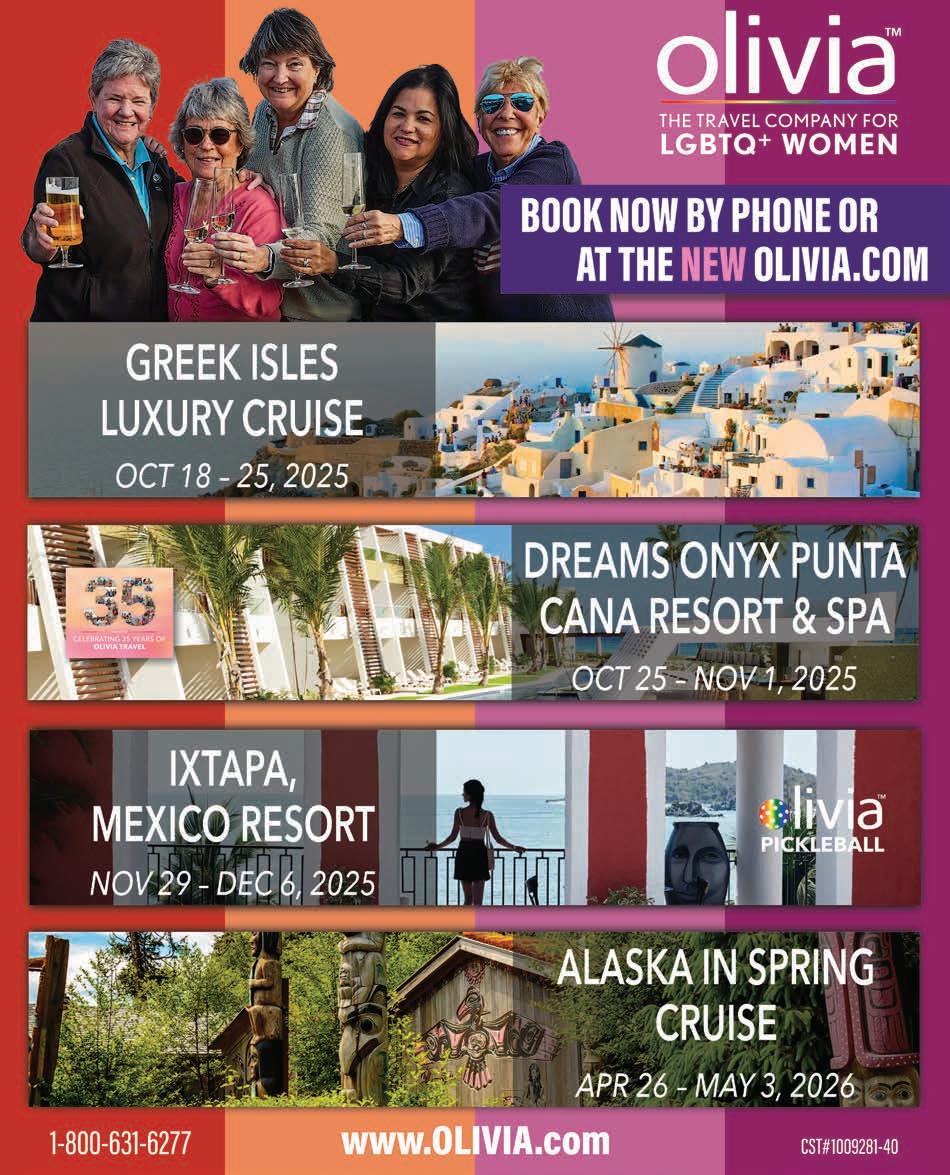

By Sister Dana Van Iquity
Sister Dana sez, “Now that Pride Month is over, should we be less proud? Absolutely not! Pride is not just a month—it’s a movement. Our work doesn’t end on June 29. Pride is 365, 24/7!”
Honoring gay rights activist Harvey Milk on June 27, two days before the Pride Parade, was the CELEBRATION OF HARVEY MILK PLAZA MEMORIAL at the Mayor’s Press Conference held at Castro and Market Streets. Construction on the redesign of Milk Plaza will begin in 2026, and is expected to be completed in 2028. Praising Harvey and giving inspirational speeches at the celebration were Mayor Daniel Lurie, Supervisor Rafael Mandelman , and other city community leaders. This happened after the Navy ship USNS Harvey Milk had been unnecessarily
and viciously renamed by the anti-DEI Secretary of Defense—because, well, you know, Milk was, you know, gay So, this is how the White House honors Pride Month? On June 5, Hegseth had announced he was ordering the Navy to rename the ship, which needed to be changed as part of “the re-establishing of warrior culture.” Sister Dana sez, “Need we point out that warrior Milk was a combat veteran and was a decorated officer on a Navy rescue ship during the Korean War?!”
Community activists in San Francisco are rallying to support Hilary Rivers, an immigrant drag queen who was arrested by ICE agents after an asylum hearing a few weeks ago—one of the latest LGBTQ victims of the Trump administration’s campaign for mass deportations. Rivers (legal name not revealed, for his protection) had fled his home in Guatemala due to “traumatic and severe” persecution for being gay. The night before her arrest, Rivers had performed at Miss & Mr. Safe Latino, a beloved queer community pageant that began during the height of the HIV/AIDS crisis and celebrated its 30th anniversary this year. Sister Dana sez, “Apparently now it’s back to the Bad Old Days— when being gay was a crime and illegal!”
We SF Sisters of Perpetual Indulgence have recently sainted Andry José Hernández Romero, who left Venezuela a year ago to seek a better future in the United States.
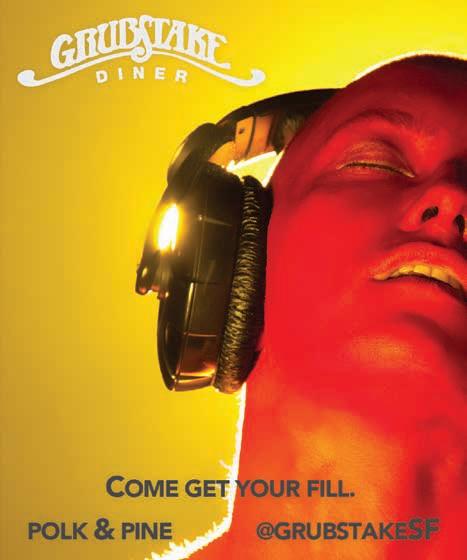
On May 23, 2024— just two days after his 31st birthday—this gay, persecuted artist migrated with the hope of one day opening a beauty salon in the U.S., or making a living from one of his other passions: design and tailoring. But he, like hundreds of Venezuelans, was kidnapped by ICE and thrown into a dangerous El Salvador prison—never to be heard from by anyone. His newly sanctified name is Nuestro Sagrado Corazón de las Dos Coronas
In English, it translates to “Our Sacred Heart of the Two Crowns.”
To elaborate, “Sacred Heart” relates to the intersectionality of our community, and “Two Crowns” refers to the two crown tattoos that the Trump Deportation thugs used as “proof” Andry was a “gang member.”

Shortly after the horrible floods in Texas, and now New Mexico, we find out that the federal detention facility in Florida, officially named “Alligator Alcatraz,” is only the beginning when it comes to FEMA money being used to fund ICE operations, according to a source within the federal agency. Trump wants to completely eliminate FEMA. The new program, suitably dubbed “the ICE grant” by FEMA employees, means that millions in grant funds intended for shelters and facilities for noncitizen migrants may now be redirected toward detention centers and whatever else ICE decides. Sister Dana sez, “Thanks (not), DHS Secretary nobody Noem, for using our San Francisco name for your disgusting Florida jail! And thanks (also not) to the Bogus Billionaires’ Bonus (BBB) bill for allotting billions of dollars towards MORE illegal ICE attacks!”
A July 7 document to a United Nations inquiry regarding mass deportations to El Salvador prisons has revealed that the government of El Salvador does NOT have legal responsibility for the men trapped there, and that it was merely doing the United States’ bidding when it accepted men into its prison system. This casts huge doubt and dispute on the White House’s false claims about deported immigrants and who controls their destiny.
And meanwhile, Noem’s masked, armed, unidentified ICE agents separate and deport children, detain American citizens, ambush workers at their workplaces, camp outside of schools and churches, and hunt folks going through the LEGAL immigration process. Sister Dana sez, “Go home, Noem! You need to be ICEd!”
Let it be noted that Trump’s border czar, inhuman Homan, admitted on Fox-TV that Immigration and Customs Enforcement (icky ice) is racially profiling the immigrants being rounded up in raids across the
country. “People need to understand ICE officers and Border Patrol, they don’t need probable cause to walk up to somebody, briefly detain them, and question them,” Homan said on July 11 on Fox, adding that he says ICE agents can detain people “based on ... their physical appearance.” Sister Dana sez, “Stop taking away from deserving white people those oh so cushy, comfy jobs that immigrants get to have—picking fruit and veggies in the hot, backbreaking, sweaty, sweltering sun. Red-blooded American white nationalist supremacists like Stephen Miller really deserve those jobs!”
AIDS WALK SAN FRANCISCO is on Sunday morning, July 20. Last year, folx walked alongside thousands of our friends, family, and neighbors through Golden Gate Park and showed the entire Bay Area how powerful we are when we are united! Because of the dedication and compassion of Walkers, we are able to continue impacting and transforming lives through this 5K walk in the park (and that’s not an idiom—it’s a fact). Since its inception in 1987, AIDS Walk San Francisco has inspired countless thousands of Bay Area residents to walk, donate, and volunteer in the fight against HIV/AIDS, raising more than $96 million for organizations across seven Bay Area counties. Make sure to arrive at Robin Williams Meadow by 10 am, which is when they will have the prewalk festivities. The 5K Walk will officially start at 10:30 am. After having received your Certificate of Completion, you might want to grab some refreshments and stay for a Post-Walk Picnic at noon with special entertainment. https://sf.aidswalk.net/
On Sunday night, July 20, join PROJECT OPEN HAND at Marines’ Memorial Theater, 609 Sutter Street, 2nd floor for HELP IS ON THE WAY XXXI: Broadway and Beyond! THE RICHMOND/ ERMET AID FOUNDATION (REAF) is hosting their annual show, “Help Is on the Way,” and is partnering with Project
(continued on page 40)

A rite of summer in San Francisco every three to five years is the blooming of one of the San Francisco Conservatory of Flowers’ Amorphophallus titanum (“misshapen penis”) plants. Often this happens a few weeks before Pride, but this year, Chanel waited until the 4th of July to cycle into bloom mode. By the evening of July 8, Chanel was unfurling their blood-hued spathe and releasing a stench that literally caused some visitors to gag. Others have come to appreciate the odor that, like a fine wine, leads to many descriptions: a well-seasoned steak ready for the grill, old gym socks, strong cheese, dog poop, or other distinctive scents.
The plant is human sized and oozing with sex. From its Latin name inspired by the giant yellow spadix that stands erect before flopping over after the momentous bloom, to its thousands of cream-colored male flowers and thousands of pink-hued female flowers, Amorphophallus titanum is a seductive marvel of nature. The spathe envelops the flowers, with the female ones opening up before the male flowers to avoid self-pollination.
The plant’s life cycle starts with a seed from one of the fruits resulting from the pollination. The seed develops into a tuber, which looks like an enormous potato. It produces a single leaf that resembles a tall spotted palm tree. The plant will go through at least two leaf-growing cycles, with photosynthesis producing energy that is stored in the tuber. It can take around three to ten years for the



plant to store enough energy to result in the flower cycle that includes the “bloom” or the unfurling of the spathe. The bloom and its odor only last for a few days, so there is always a rush for fans of this Sumatran native to see the spectacle.
This year’s bloom was particularly pungent, such that Chanel could be smelled throughout nearly all rooms of the conservatory. Will Scarlet or Mirage be next? Those two plants bloomed in earlier years and, with their tubers saved, are in their leaf-growing cycles now, readying for their next moment in the summer spotlight.
https://gggp.org/conservatory-of-flowers/


Berets and French fare were de rigueur at Rockridge Market Hall on July 12, 2025, for the 8th annual Bastille Day celebration (ahead of the actual holiday that falls on July 14). The event included oysters on the half shell and poached prawns from Billingsgate Seafood served with beverages from Paul Marcus Wines and Aplós non-alcoholic drinks. The market’s newly separate Cheese Shop offered Jambon de Bayonne (a delicate French ham), Roquefort, and Basque cherry jam. Marin Sun Farms had samples of merguez sausages and duck confit, while Market Hall Produce served chocolate crêpes and American-style pancakes from a French bakery.
Market Hall Foods had a French-inspired menu that included Beef Bourguignon, coq au vin, pissaladière, ratatouille, and Gateau Basque. On Bastille Day, Chez Panisse in nearby Berkeley held its annual garlic celebration. That tradition started in 1975 and has always included French-themed music and entertainment.
Rockridge Market Hall
https://rockridgemarkethall.com/
Chez Panisse
https://www.chezpanisse.com/

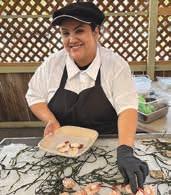
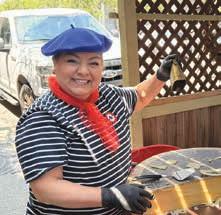


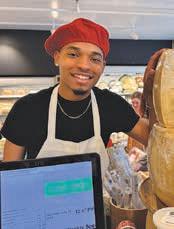
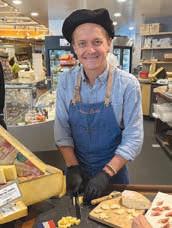


In the sea of industrial clean-lined restaurants popping up in SF—those sterile spaces with exposed concrete, minimalist plants, and all the warmth of a tech office—Catch French Bistro is anything but. Walking into Catch feels like stepping into someone’s vibrant, well-lived-in home. Warm tones envelope you, French pop art catches your eye from every corner, and colors that make you feel pride every day of the year create an atmosphere that pulses with life.
The colorful umbrellas hanging from the ceiling aren’t just decoration—they’re a statement. In a neighborhood often viewed as being for gay men, these umbrellas seem to whisper: “You can be under our umbrella.” Catch is the catch-all for all people, managed pridefully and colorfully by humans who understand that hospitality isn’t just about serving food and drinks; it’s about creating a space where every person can feel the quirks that only a human touch can bring ... right now.
So, who are the humans behind the magic of Catch?
Amy, the Co-Manager, embodies the multilayered complexity that makes Catch special. She flows between French and English with the same grace she brings to dancing between conversations among multiple tables. There’s something more poetic about her presence than any algorithm could capture—a warmth that translates into every interaction, every recommendation, every moment she spends ensuring guests feel welcomed.
Alberto, the longest-tenured employee and Co-Manager alongside Amy, carries thirteen years of Catch’s history in his approach to hospitality. His empathy isn’t programmed—it’s earned through countless interactions, reading guests’ needs before they voice them, and understanding that sometimes the perfect drink isn’t about perfect ratios but about perfect timing and genuine care.
Mina, the Owner, has curated this space with intentional passion. Every design choice is a deliberate expression of his vision. His huge smile isn’t a customer service technique; it’s genuine enthusiasm for creating a space that celebrates the Castro’s heritage in queer culture while maintaining a place for all.
Despite all the advances in artificial intelligence, it’s an open question whether it’s human enough to make things taste good. I decided to put this to the test, and see whether AI could capture the essence of these remarkable humans. I asked ChatGPT to create cocktails representing each of their personalities.
What this experiment revealed wasn’t that AI can’t create decent cocktails; it can. What it revealed is that the human touch isn’t just about technical skill or perfect ratios. It’s about the story behind the drink,
Dina Novarr
the intention in every pour, the ability to read a guest’s mood and adjust accordingly. In Catch French Bistro, surrounded by those intentional pops of color and under the protective embrace of those hanging umbrellas, you’re not just drinking a cocktail—you’re experiencing the culmination of Amy’s multilingual grace, Alberto’s thirteen years of refined empathy, and Mina’s passionate vision for inclusive celebration.
AI might be able to suggest the ingredients, but it takes humans to create the magic that makes you want to stay, to return, to bring your friends under that colorful umbrella where everyone belongs. In a city increasingly dominated by algorithmic efficiency and industrial aesthetics, Catch reminds us that the most essential ingredient in any recipe—whether for a cocktail or a community—is the irreplaceable human touch. San Francisco-based Dina Novarr enjoys sharing her passion for fine wines, spirits, non-alcoholic craft beverages, and more with others.
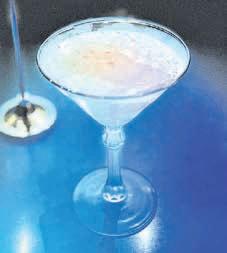
Mina’s Cocktail: When AI Gets Suprising Human
ChatGPT’s Recipe:
1.5 oz vodka
0.5 oz elderflower liqueur
0.75 oz fresh grapefruit juice
0.5 oz strawberry syrup
Dash of chili tincture
We all perhaps wanted to dislike this cocktail, but this is where ChatGPT was most surprisingly human. The drink wasn’t bad at all and instead was decent. Disturbingly decent. It captured something essential about Mina’s passionate, encouraging nature. Was it as excellent as Mina himself, or as perfect as Alberto’s thirteen years of bar management experience could make it? Absolutely not. But it had heart. The only adjustments needed were removing the chili tincture, which overwhelmed everything like a bad breakup, and adding a splash of soda water for brightness.


Amy’s Cocktail: The Theory vs. Reality ChatGPT’s Suggested Recipe:
2 oz mezcal
0.75 oz cucumber juice
0.5 oz agave nectar
1 thin slice of fresh ginger (optional)
A pinch of sea salt
Shaken, strained into a martini glass.
The AI’s reasoning was adorably pretentious—cucumber for humility, agave for kindness, mezcal for authenticity. It was like watching a robot try to explain human emotions using a Wikipedia entry. The cocktail tasted like an AI’s interpretation of complexity: technically correct but missing the spark that makes life worth living.
Amy’s Human Touch Revision:
2 oz mezcal
0.75 oz cucumber juice
0.75 oz lime juice
0.5 oz agave nectar
1 thin slice of fresh ginger
A splash of soda water
Tajin salt rim
Shaken, strained into a martini glass.
The difference was immediate and profound. The lime juice brightened the cucumber and tempered the sweetness from the agave. The mezcal sang subtly, harmonizing with the other elements rather than dominating them. It felt authentic— delightfully colorful and made with natural ingredients, much like the vibrant nature of Catch French Bistro itself. The soda water brought life and effervescence, making the cocktail as dynamic as Amy’s multilingual conversations.


Alberto’s Cocktail:
AI’s Suprising Success
ChatGPT’s Recipe:
1.5 oz gin (Hendrick’s or St. George Botanivore)
0.5 oz lavender honey syrup
0.75 oz fresh lemon juice
0.5 oz white peach purée
Optional: egg white for texture
The AI’s reasoning was surprisingly sophisticated—describing the drink as “emotionally active.” The cocktail smelled wonderful and had compelling complexity, though the gin balance wasn’t quite right. Perhaps the word “empathy” drove the AI toward sweetness— after all, empathetic people do tend to be sweet.
Alberto’s Final Touch:
2 oz gin Hendrick’s
0.5 oz lavender honey syrup
0.75 oz fresh lemon juice
0.5 oz white peach purée
Prosecco float
Shake and pour over a tall drink glass with ice.
A few small edits, but ChatGPT had almost seemed to execute this with a human touch! The increase in gin provided better backbone, while the Prosecco float added celebration—fitting for a space that honors joy and community.
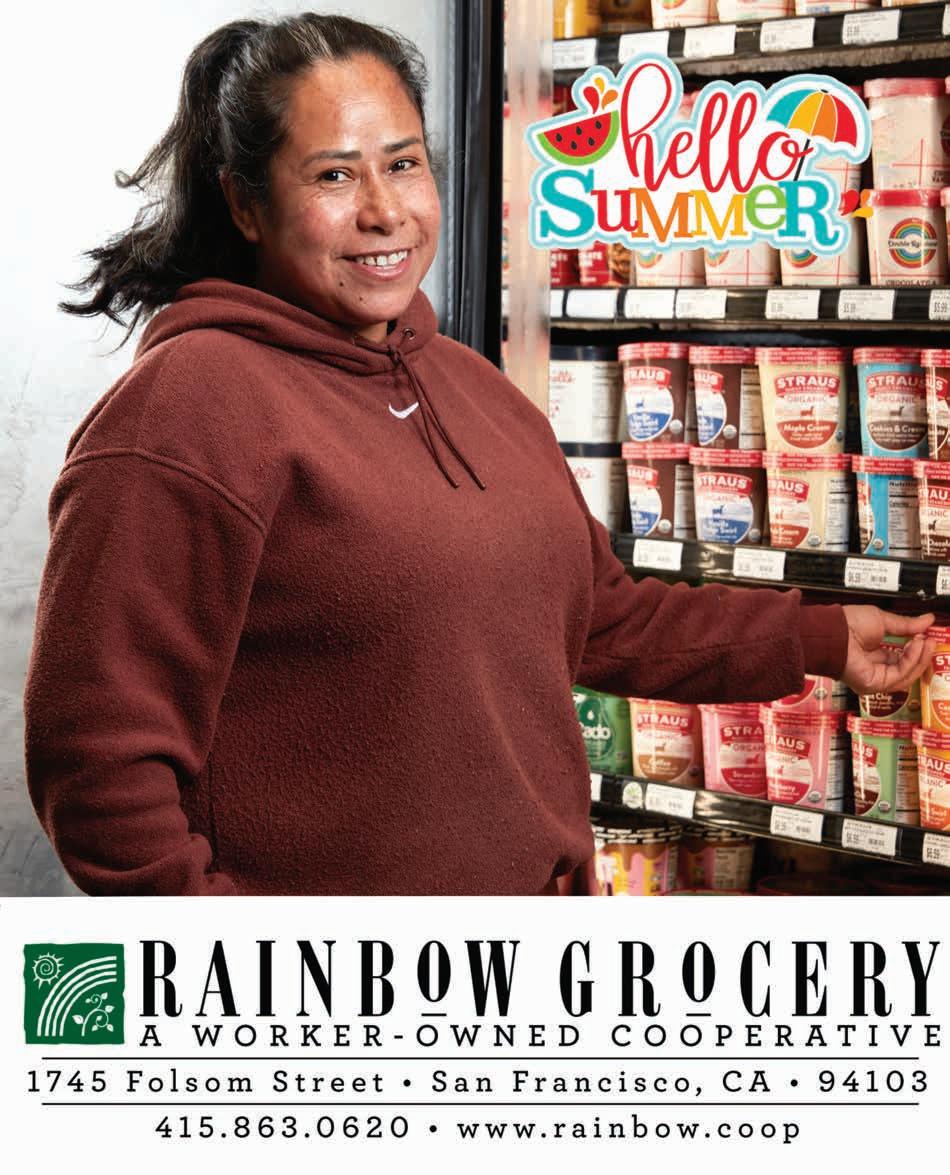
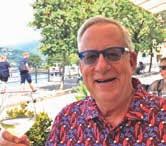
I’ve heard a lot of buzz about Parche and Jaji restaurants in Oakland from numerous sources, but I have yet to get there to try them out firsthand. So, I thought, why not ask Chef Paul Iglesias to give us his personal thoughts about taking traditional recipes and reinterpreting them for modern, California eaters? What follows, in his own words, are his ideas about how “innovation and cultural identity collide in modern kitchens.”
“Food has always meant more than just sustenance to me. It’s a language, a bridge, and often, a place of belonging, especially for those of us who grew up with one foot in two worlds. My wife Sophia and I are both children of immigrants, Colombian and Afghan,
respectively, and when we opened Parche and later Jaji in Uptown Oakland, we didn’t just want to recreate the food of our childhoods. We wanted to explore what happens when you take those traditions and reframe them through a contemporary lens.
This isn’t about making food ‘fancier.’ It’s about using the tools and techniques available to us now to tell a deeper story: one that’s layered with memory, innovation, and identity. And most importantly, it’s about creating spaces where people similar to us, who maybe don’t always see their cultures represented in modern dining rooms, can feel at home.”
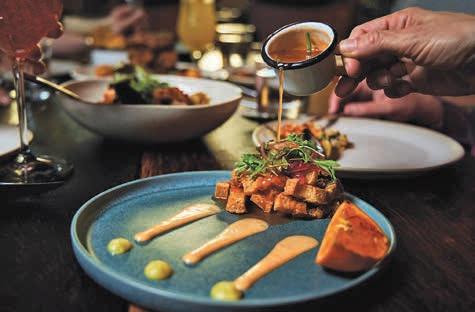

“We opened Parche in 2023 with the goal of reintroducing Colombian cuisine to the Bay Area, this time with a different perspective. Colombian food is beautifully diverse, with roots in Indigenous, Afro-Caribbean, Arab, and Spanish traditions. But it’s often pigeonholed or underrepresented. We wanted to change that.
Take our arroz atollado, for instance; traditionally a rich, sticky rice dish from the Pacific region of Colombia. Ours is vegan, made with creamy cashew cheese, briny olives, and mild peppers. It hits the same notes of comfort and depth, but in a way that feels relevant to today’s diners. Our chicharrón ‘ceviche’ features crispy pork belly splashed tableside with a sour marinade, turning a classic into something playful and unexpected.
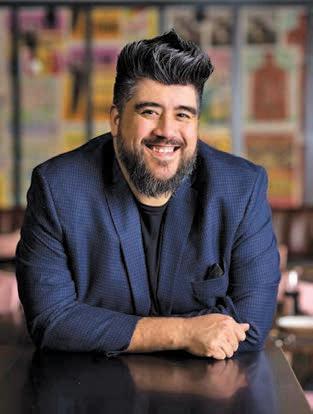
Much of this comes from our time in other restaurants. Before Parche, my wife and I both worked at Telefèric Barcelona and Canela Bistro, where we were exposed to Spanish-style tapas and the power of a thoughtfully curated cocktail program. That influence shows up in our format (small, shareable plates) and in our beverage list, which leans heavily into tropical fruits, herbs, and Colombian spirits.
Still, the guiding hand is personal. Parche is for my family, my parents, and my heritage. But it’s also for our kids, who deserve to grow up seeing their culture not only reflected but celebrated.”
Family History, Reimagined
“Sophia and I opened Jaji just blocks away from Parche in early 2025. If Parche was my love letter to Colombia, Jaji is hers to Afghanistan.
Walking into Jaji feels like stepping into Sophia’s family story. The ceiling is draped with 327 pieces of chiffon in the colors of Afghan poppy fields, all hand-sewn by her mother, grandmother, and family friends. Heirlooms (Afghan wedding garments, drums, and photos) line the walls. The space is deeply rooted in tradition. But like the food, it doesn’t stay there.
At Jaji, we didn’t want to simply copy the dishes Sophia grew up with, we wanted to reinterpret them in a way that felt authentic to our lives today. Our ‘Ducktu’ dish is a great example. Traditionally, Afghan mantu are dumplings filled with ground beef and served with yogurt and split peas. Ours are made with confit duck, slowly cooked in fat, and served with charred leeks and a ginger-miso consommé poured tableside. The flavors are all there, but the presentation is entirely our own.
onions and topped with a walnut qoroot aioli and mint oil. When Sophia’s elders tasted it, they were hesitant at first. But after a few bites, they understood exactly what we were trying to do.”
Walking the Line Between Reverence and Reinvention
“One of the most common questions we get is: ‘Why not just serve the traditional version?’ And the answer to that is layered. For one, there are already incredible Afghan and Colombian restaurants that serve traditional dishes that we love and support. Our aim was different. We wanted to create something that represented us as people raised in America and deeply connected to our cultural roots. That means giving ourselves permission to evolve these dishes while still respecting where they came from.
We also know that food is one of the most powerful tools for building community. At both restaurants, we’ve seen people bring in friends, coworkers,
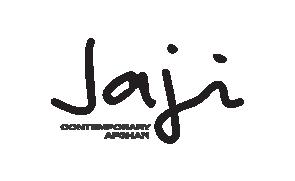
Another dish, the Shola-Qorooti croquettes, is inspired by a sticky mung bean rice that Sophia’s grandmother used to make. We turned that memory into a crisp, craveable croquette filled with
(continued on page 39)

and partners who may have never tried Afghan or Colombian food before. We see Iranians and Pakistanis come into Jaji and say, ‘This reminds me of home,’ then bring back friends who’ve never had sabzi or pekora. That kind of cultural bridge is what keeps us going. At the same time, we’ve had to learn how to stay grounded in our purpose. Not everyone gets what we’re doing, and that’s okay. There will always be guests who say it’s ‘not authentic enough,’ or that it’s not how their abuela or grandmother made it. But we’re not trying to replicate anyone else’s experience. We’re honoring ours.”
“A big part of why we do this is for our kids. We wanted them to grow up with restaurants that reflect both sides of who they are. We wanted them to walk into a dining room and see dishes that carry the story of their family. And we wanted them to understand that tradition doesn’t have to be frozen in time. You can honor where you came from while still moving forward.
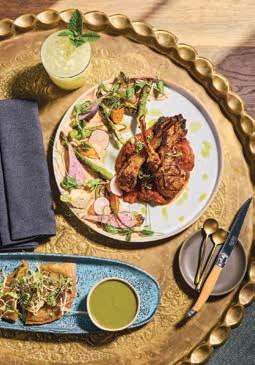
that highlight ingredients like turmeric, cumin, coriander, and dried citrus. It’s another opportunity to blend tradition with innovation and to keep evolving.
And, of course, this is all possible because of Oakland. The city has embraced us in ways we never expected. It’s where we’ve built our team, many of whom are firstor second-generation immigrants themselves. It’s a place that understands the power of community and the importance of showing up for one another.”
“We’re currently working on launching BakBar, a cocktail-focused lounge hidden inside Jaji. It’s something totally new for Afghan cuisine, a space where the spice route comes alive through drinks. We’ll offer an entirely different cocktail and small bites menu there, with a focus on both alcoholic and non-alcoholic options
Ultimately, our hope is that Parche and Jaji serve as invitations. To taste. To ask questions. To celebrate identity. And to see culture not as a static artifact, but as something living, breathing, and dynamic.
We don’t pretend to have all the answers. But we do know how to feed people. And, for us, that’s the best place to start.”
Chef Paul Iglesias and his wife Sophia Akbar are the owners of Parche and Jaji in Oakland.
David Landis, aka “The Gay Gourmet,” is a foodie, a freelance writer, and a retired PR maven. You can email him at: davidlandissf@gmail.com Or visit him online at: www.gaygourmetsf.com
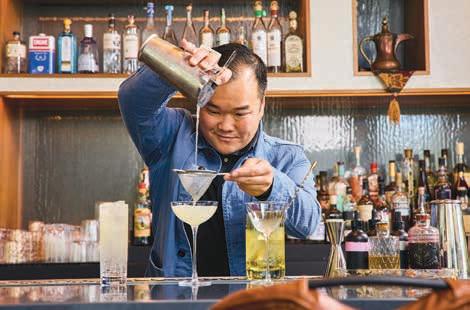
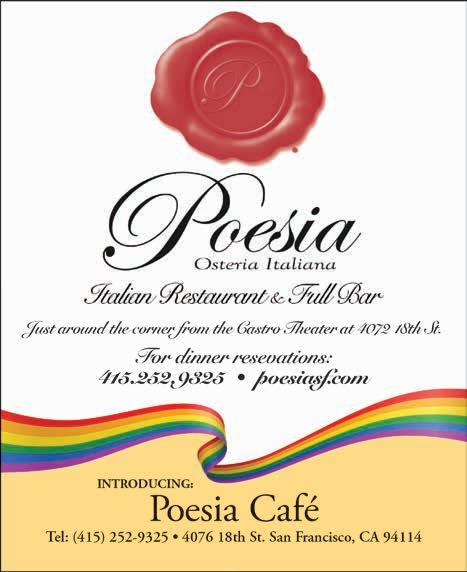
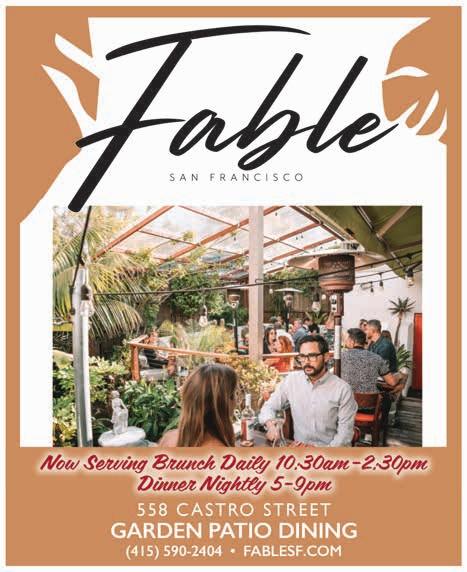


Open Hand to help them provide medically tailored meals to the community. This star-studded evening will feature performances by the cast members from the Broadway Touring Cast of & Juliet, plus Sam Harris, Julia Garnye, Bruce Vilanch, Leanne Borghesi, Jason Brock, Garrett Clayton, Paula West, and Sharon McNight! A silent auction will take place in the theater lobby starting at 6:30 pm. The concert starts at 7:30 pm. A VIP after-party will take place at the Beacon Grand Hotel (450 Powell Street) immediately following the concert. https://www.reaf-sf.org/
Neighborhood community markets are thriving! Friday, July 18, 5–10 pm is THE CASTRO NIGHT MARKET, where you can enjoy local food vendors, merchants, art, and live entertainment on the 3rd Friday of every month! And on Saturday, July 19, 4–8:30 pm is THE GLEN PARK NIGHT MARKET, where you will find neighborhood food vendors, merchants, and live performances in Kern Street (Diamond to Brompton). Additionally on Tuesday, July 29, 4:30–8:30 pm there will be THE NOE VALLEY NIGHT MARKET, which is growing with the expanded footprint onto 24th Street. Enjoy live entertainment, local artists, and delicious food! Also on every Wednesday, 3–7 pm, THE CASTRO FARMERS’ MARKET is open on Noe & Market Streets. Check out all of the markets!
I highly recommend the Netflix drag-oriented LGBTQ film, I’M YOUR VENUS , when two very different families of Paris Is
Burning star Venus Xtravaganza unite. Her straight family brothers and drag family sisters honor her and reopen her unsolved murder case in this amazing investigative, emotional, social, and cultural documentary.
The 45th SAN FRANCISCO JEWISH FILM FESTIVAL (SFJFF), presented by the Jewish Film Institute, returns July 17–August 3 to the San Francisco Bay Area with its signature showcase of the world’s leading Jewish-content cinema. SFJFF embraces the full spectrum of Jewish identity through its expansive lineup of dramatic and documentary features, episodic programs, shorts, and more. https://sfjff.org/25
UP YOUR ALLEY is coming up on Sunday, July 27! This annual event has been around for over 30 years, and it has grown from a small party, “Dore Alley Fair,” on cruisy Ringold Street in the mid-1980s to a 2024 gathering of more than 12,000 people on Folsom between 9th and 11th streets including Dore Street. There will be live music, go-go dancers, performances and demos, food trucks, beverages for sale, vendors to shop, and more! Near 9th and Folsom streets, the naughty fun starts at 11 am and ends at 6 pm. Not for the faint of heart. FREE, but donations are encouraged. https://www.folsomstreet.org/
Sister Dana sez, “DORE ‘UP YOUR ALLEY’ STREET FAIR is right around the corner. You don’t HAVE to be into leather or latex or kink—but it helps! Come dressed to express!”
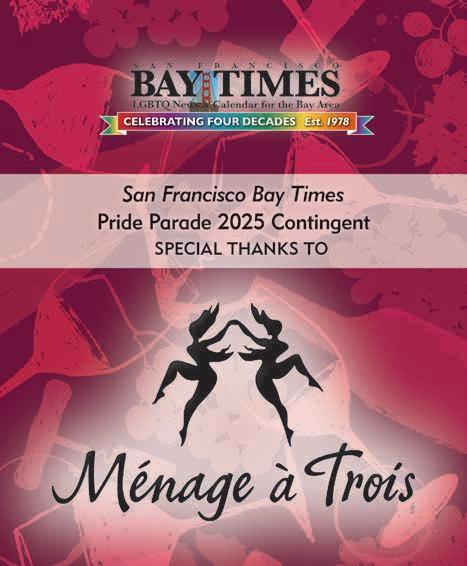

Mae and Maeve, 1-year-old calicos with beautiful medium-length coats, are a bonded pair who have perfected the art of sisterly support.
Mae, with more white fur, is the slightly braver explorer who will investigate toys and accept treats, while also serving as Maeve’s personal grooming service— because what are sisters for? Maeve, with her tabby stripes, prefers to observe the world from a safe distance, letting Mae


do the reconnaissance work before deciding if something is worth her attention.
These sensitive souls are looking for a calm, quiet home with patient adults who understand that trust is earned one gentle pet at a time. The feline duo is perfect for someone who appreciates cats with depth and doesn’t mind gradually winning over these two beauties who just need time to realize you’re worth knowing. These devoted sisters draw strength from each other and would thrive in a peaceful household where they can continue their journey together.
The OAS adoption process focuses on matching you with a pet who is a good fit for you and your family. Come by during open adoption hours Thursdays 12–7 pm and Fridays/Saturdays/Sundays 12–3 pm to adopt your new best friend, or to learn more about the OAS adoption process. Please see the OAS website to learn more about how you can help by adopting, fostering, volunteering, and donating: www.oaklandanimalservices.org
Fanny, a 1-year-old border collie mix bursting with love and energy, is hoping to find her perfect match—and thanks to a generous donor, her adoption fee has already been sponsored. This sweet and playful pup is still gaining confidence around new people, but once she warms up, she transforms into an affectionate lovebug. Fanny thrives with positive reinforcement training and is eager to continue learning and growing with a patient family by her side.
True to her border collie roots, Fanny is full of enthusiasm and adores romping around the park with her canine friends. Whether it’s a spirited game of chase or a playful wrestling match, she’s always ready for fun. Because of her energetic nature, Fanny would do best in a home without young children, where she can continue building her confidence at her own pace.

Fanny is currently available for adoption at the San Francisco SPCA Mission Campus, located at 201 Alabama Street. The shelter is open Wednesday through Sunday from 11 am to 6 pm, and Tuesdays from 1 pm to 6 pm.
If you’re ready for a lively, loving companion to join your family, Fanny would love to meet you—and win your heart.
https://www.sfspca.org/adoptions/


Cable Tricep Pushdown
By Spencer Macalino of FITNESS SF
Keep your elbows tucked in, close to your sides, during cable tricep pushdowns to focus the effort on your triceps and avoid using your shoulders.


Troy Macfarland at FITNESS SF shares monthly tips that he has learned from colleagues, fellow professional trainers, and more. For additional information: https://fitnesssf.com/

